Turquoise Energy Newsletter #150 - November 2020
Turquoise Energy
News #150
covering
November 2020 (Posted December 4th 2020 AD / 25 AI - After
Internet)
Lawnhill BC Canada - by Craig Carmichael
www.TurquoiseEnergy.com
= www.ElectricCaik.com
= www.ElectricHubcap.com
Month In "Brief" (Project
Summaries etc.)
- Carport - A renter comes and goes - Lithium Ion Battery
Assembly - Small 12V COB LED Panel Light - Mini T-Plug Shells -
Misrepresentations about renewable energy: Discernment
In Passing
(Miscellaneous topics, editorial comments & opinionated rants)
- USA: Corrupted Processes and the Need to Evolve Democracy
- Efficacy of Ivermectin for treating CoViD-19 (This pandemic
should be HISTORY!) - Chickens & Gardening - Small Thots
(Carbonated Beverages and Tooth Decay - Gold Confiscation?) - ESD
- Detailed
Project Reports -
Electric Transport - Electric Hubcap Motor
Systems
* Just the start of a writeup on Ground Effect Craft ducted fan
controls
Other "Green" Electric
Equipment Projects
* Small 3D Printed 12V COB LED Panel Light
Electricity
Generation
* My Solar Power System: - Monthly Solar Production
log et cetera - Notes: Cloudiest weather ever.
Electricity Storage
* Turquoise Battery Project (NiMnOx-Zn in Mixed Alkali-Salt
electrolyte) - No Report
* Assembling my LG 120 AH Lithium Ion Cells Into 36V 'Stack' -
Some thoughts on those
I continued making my carport/lumber storage/firewood
storage place, started in October. Somehow even that got postponed
and delayed to extremes. I joked to someone that I was putting up
one post a week, which wasn't far from the truth.
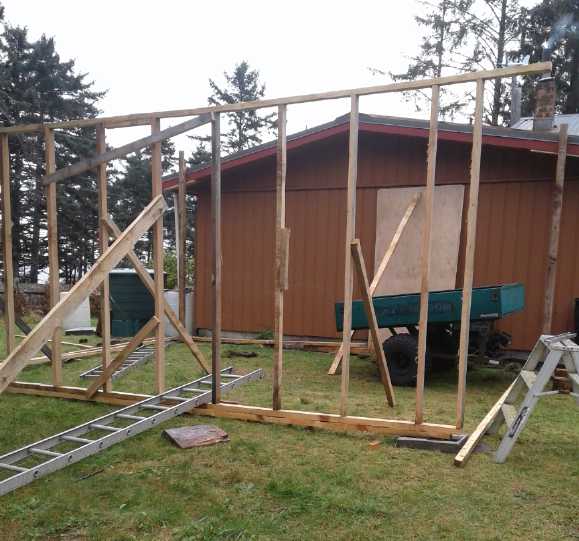 Carport project Nov. 8th.
Carport project Nov. 8th.
One wall got framed in a couple of days. And then it sat... and
sat...
But in less than ideal weather I finally got the
three roof support posts up on the house side, some plywood on the
outer wall to stiffen it, and the last rafters up by the 30th.
I had intended to make it very light, but with a 15
foot span I realized I had better use 2"x6"s for the rafters, and
lag bolt the heavy posts to the house to hold it upright.
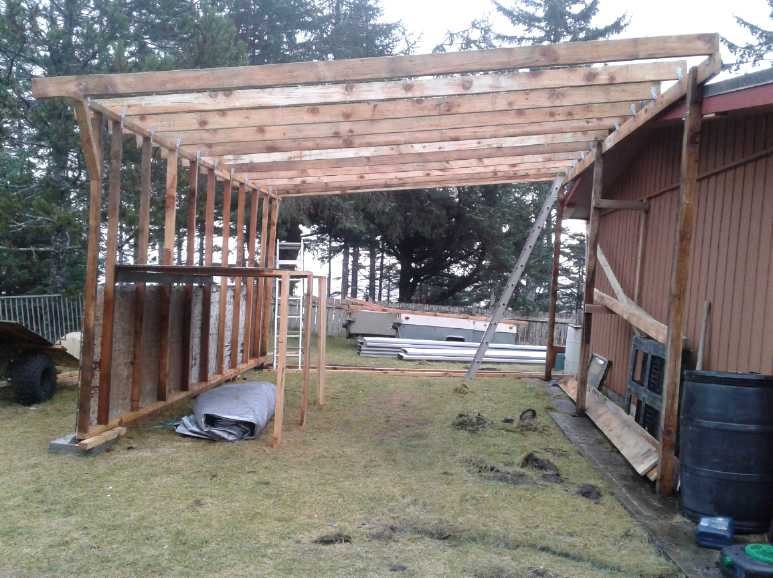
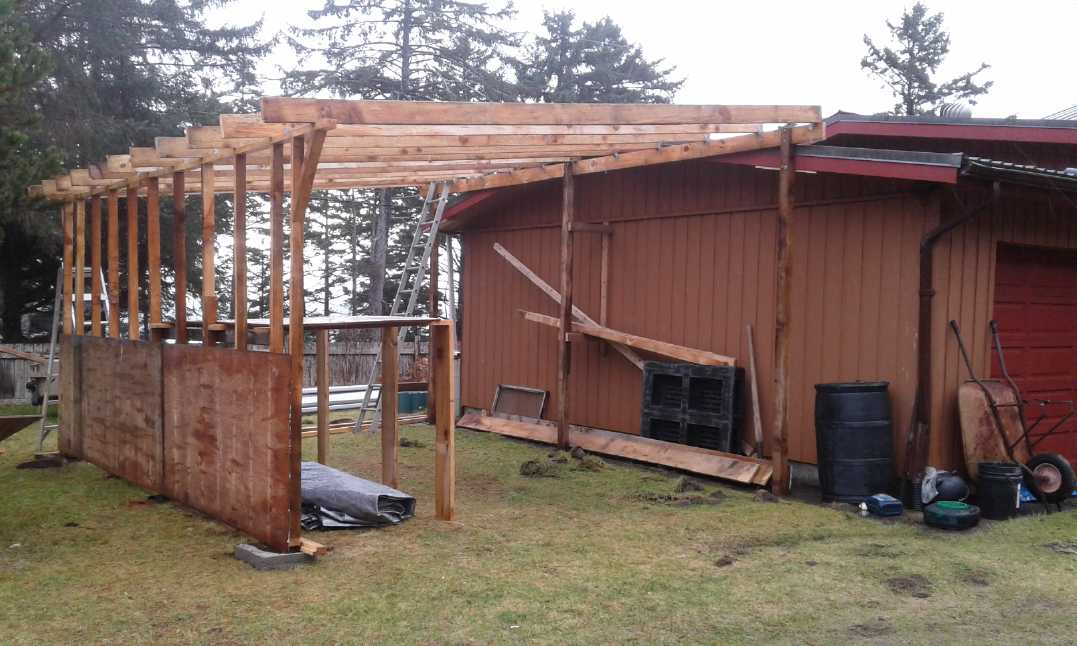 Two views of the ~16 by 20
foot carport/lumber/firewood shed
Two views of the ~16 by 20
foot carport/lumber/firewood shed
project, started in October, at the end of November.
Except for the plywood and one post, all the lumber was spruce
from my own trees,
cut on the handheld bandsaw mill that I created in 2018. Using
it shrank my lumber
piles, but not by a lot.
(I could have used scaffolding everywhere doing
the rafters. I went up and down ladders a lot.)
I had many times thought about renting out my travel
trailer, and unexpectedly got an eager renter for it in October.
But it proved too hard to keep it warm. It's really a summer abode
and I said sorry, I regretted renting it. But my renter at that
point got an offer of a lovely place in Vernon, from where she
could continue her university studies in the Okanagan.
It's funny how serendipity works. If I hadn't rented
her the trailer, she'd have signed a lease agreement in October
for the more costly place she had been looking at, would have been
just all settled in and paid a deposit, and wouldn't have been
able to move back to Vernon. The month in the trailer lined up the
timelines for her. (She phoned and said she had made it to Vernon
in 5 days, towing a huge 8'x12' trailer piled high with 2000-3000
pounds of stuff in it, at low speed with her none too large SUV,
hogging the highway the whole way. She left plenty behind too -
ugh!)
I "inherited" her 11 young chickens, two ducks and a
turkey. (Was 13 - She gave 2 chickens to someone else.) Now they
need another space besides my fenced-in garden before spring!)
As usual in the last few months I didn't find much
time for energy projects. I didn't tackle the steering-power
control for the RC model ground effect vehicle, or my new
chemistry batteries. I did manage a couple of small things.
Lithium Ion Battery Assembly
One was that I at last put together one of three
stacks of ten 3.6V, 120AH lithium cells, making a 36 volt battery
of 4320 watt-hours.
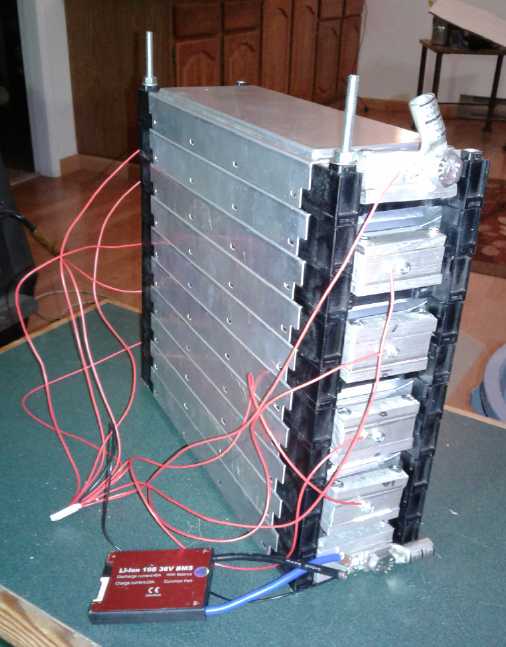 I had purchased these new but 'surplus' cells in the summer - a
bargain but no small expense for so many. (30 + 2 spares) They
needed a custom means of clamping the floppy tab ends together and
to solid terminal blocks. I had arranged with someone who was
going to Prince Rupert to buy aluminum to pick me up a long piece
of 1/2"x3/4" that I could cut up to make these clamps. I finally
phoned to ask if perchance he had done it yet. He had, but he had
forgotten why he got that piece. Picking up the aluminum was the
pivot that got me putting the stack together. (Also I was a bit
concerned that they hadn't been charged in many months. The other
22 still haven't.)
I had purchased these new but 'surplus' cells in the summer - a
bargain but no small expense for so many. (30 + 2 spares) They
needed a custom means of clamping the floppy tab ends together and
to solid terminal blocks. I had arranged with someone who was
going to Prince Rupert to buy aluminum to pick me up a long piece
of 1/2"x3/4" that I could cut up to make these clamps. I finally
phoned to ask if perchance he had done it yet. He had, but he had
forgotten why he got that piece. Picking up the aluminum was the
pivot that got me putting the stack together. (Also I was a bit
concerned that they hadn't been charged in many months. The other
22 still haven't.)
After having had to redo it, adding a special screw
to every clamp for the balance charger wires because only the
screws in the topmost clamps could be accessed, on the 29th I
connected up the balance charger wires. On the end clamps I made
1/2" threaded holes with stainless steel bolts for the terminal
posts, commensurate I trust with the very high current ratings.
After making one, then three, sets of connection
clamps, I did 6 more at once. (one is left over for the next
stack) Then I did the two end clamps to connect wires to. The next
two stacks should go just a little faster than the first one.
I threaded the holes in one of the aluminum bars in
each clamp so I wouldn't have to add nuts. After the first two, I
remembered a technique for threading them faster by putting the
tap in a battery operated, variable speed drill. One can go in a
ways, then reverse and quickly back the tap right out of the
piece, and brush all the bits of metal off it and when needed add
more oil before the next bit. The tap is less likely to break when
it's kept clean. There's another key to that: don't do up the
chuck too tight. Instead, if (when) the tap jams it slips in the
chuck instead of breaking. (I ended up tightening the chuck as
much as I could by hand and it still slipped when the going got
too hard.)
It would have been very tedious threading the 33
holes (1/4", 3/8" and 1/2" deep) all by hand. I only tapped the
two big 1/2" holes for the power wire bolts by hand. (Crimp
connectors for #2/0 AWG power wires in the photo.)
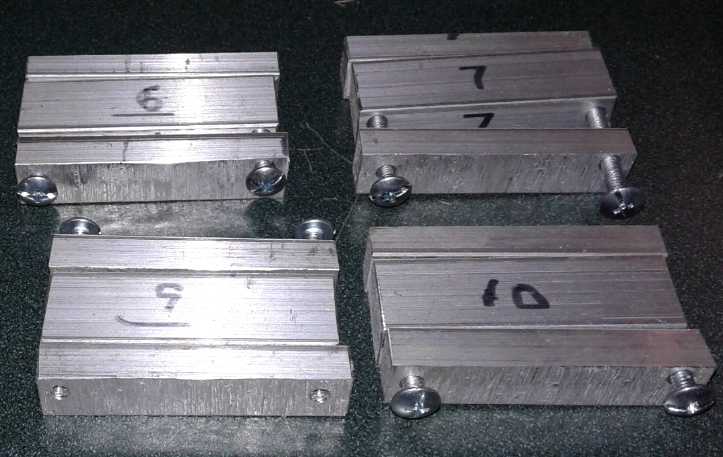 Four of the nine
interconnection clamps for each stack
Four of the nine
interconnection clamps for each stack
(before adding balance charger wire terminal bolt).
I bought 30 of these cells (plus two spares) because
of their fabulous specs for a low price, but it still seems hard
to imagine that a 44 pound stack of ten cell modules with foil
connection tabs will apparently deliver up to 320 amps continuous
(let us Not short circuit them!).
Two stacks in series (72V) ought to be able to drive
my Miles mini electric cargo van 25 Km into town with range to
spare, while weighing only about 10% as much as its original 12
golf cart batteries. (I'm not so sure about coming back without
recharging with either set.)
But I'm really hoping to finish the Sprint
"ultra-efficient EV" project with the lossless variable torque
converter... someday. One stack should run it, but I would put all
three stacks in it in parallel. That would surely get to town and
back, and substantially farther, on one charge.
And sitting in the Sprint in the garage they can
charge from the house solar panels and double as backup power for
the house should that ever be needed.
Small 12V COB LED Panel Light
I had bought a few 12 volt "COB" LED lights. They're
like a little piece of circuit board (94x50mm) with LED emitters
and a phosphor across the front. I thought that with some surplus
slabs of aluminum I could 3D print little panel lights that might
be a salable item along with other "off grid infrastructure"
products like the T-Plugs, sockets and wall plates. But the
aluminum slabs didn't have much in the way of protruding fins.
They would absorb the heat from the COB board, but not dispel it
well, so they would gradually get quite hot. I went down from 10
watts to 7 at 12.0 volts with a bigger series resistor (2.0 Ω) and
they still got too hot for my liking.
I also ordered some small ready-made panel lights
that said "12V" on the page, but which in fact needed 75-90 volts
DC without their 120-240 VAC power adapters. (They did Not get 5
stars in my rating! But I didn't trouble to send them back. I have
no use for them and I spent 80$ for 8 of them.) I got a bit
frustrated by that and went back to making my own design. On line
at Aliexpress.com again I searched for heatsinks and found some
the required size. I bought five. I resized the 3D housing to fit
and made a nice light. I kept the watts down, and it doesn't get
so hot as the previous one at the same power.
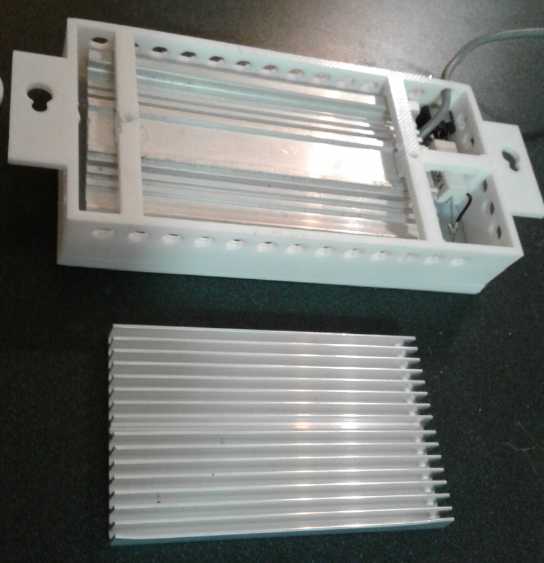 The old light with the plate
that gets too hot,
The old light with the plate
that gets too hot,
and a "proper" finned heatsink.
But somehow in spite of 3D printing the case, it
seemed like work than it was worth to assemble and wire it. (It
might seem more worthwhile if I made a whole batch, doing them all
at once.) And the light is a bit glaring. I might fix that, too,
by making the case thicker so the diffuser is farther from the
emitters.
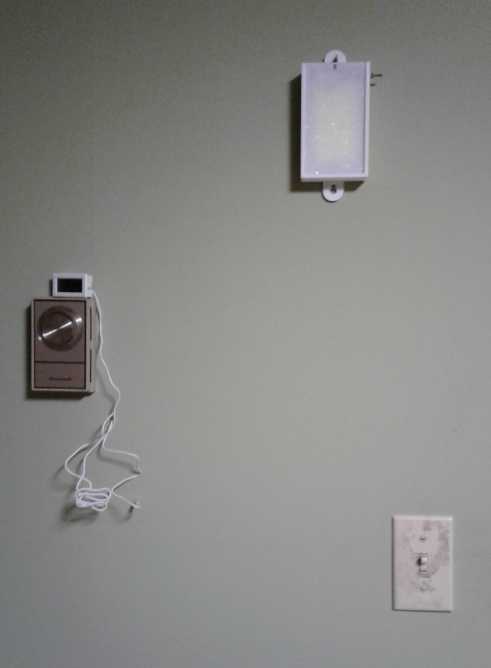 Size of the light hung on a
wall (before wiring it).
Size of the light hung on a
wall (before wiring it).
The fact that one can see the yellow phosphor outline rather
clearly
is a good indication that the light will be glaring, not an even
glow.
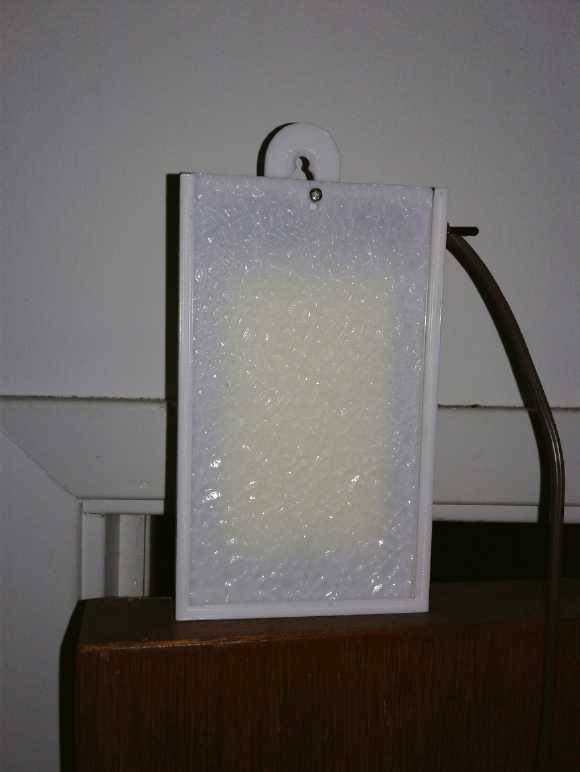
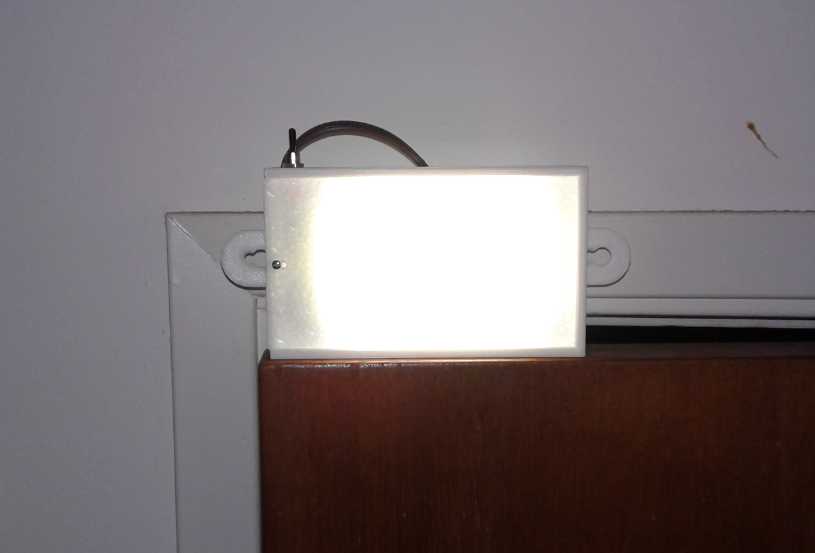 The light on "Low" (1 W).
The light on "Low" (1 W).
Hah! I used the camera flash to avoid seeing nothing but the
bright light and black all around.
Mini T-Plug Shells
["31st"] Along with doing the light, I also wanted to improve the
shell design for the 12 volt T-Plugs. The shell encloses the plug
with its bare wire and soldered connections. My first shells with
one bolt (right) tended to spring open just a bit and allowed the
plug to pull out of the shell when trying to unplug it. I finally
got to this on the morning of December 1st. (It was the last
little bit to finish my LED panel light.) I gave up my "slim cube"
design and added "ears" to put screws through near the plug blades
end. That did seem to solve the problem quite well, and I think
they still look fine. I didn't put the "ears" right at the end,
and as I hoped, that allows the user to get a good grip to unplug
it. (People always say "Don't pull on the cord!", and yet most
plugs don't have a good shape to grab and pull on them.)
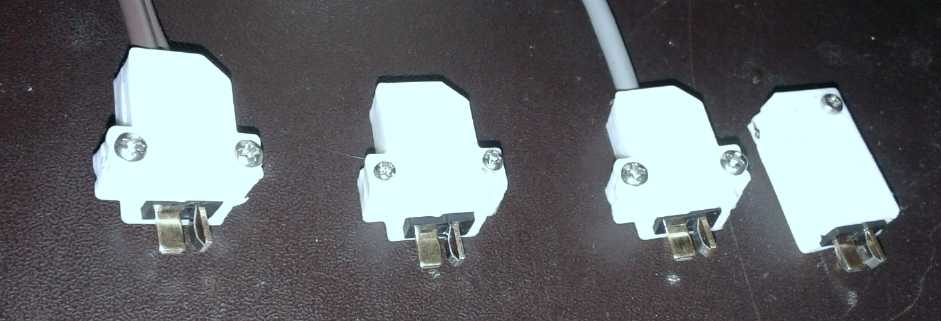 Mini-T-Plug shells. At the
right, the old one.
Mini-T-Plug shells. At the
right, the old one.
There ended up being two versions of the new ones for different
size wires "small" and "large".
The middle new shell was "sliced" with Cura and its detail is
finer than
those using "Skeinforge" - but it took almost twice as long to
print.
(And the screw holes came out too small.)
I used all three new shells on my LED light cords.
I'd better print some more to sell! Funny, I did "top:bottom" two
piece shells and never even thought of doing "front:back" shells,
which might theoretically be more estheticly pleasing. Well,
they're so small it probably doesn't matter. And these can be
added after soldering the wires on. The other type requires
remembering to slip the back piece of the shell onto the wire
before connecting the wire to the plug.
I ordered some other ready made small 12V LED panel
lights from a different AliExpress store. I trust these are good
ones. They too will get the "mini T-plug" connector with a proper
housing on the cord.
Discernment
A duplicitous video purporting to show that solar and
renewable energy is really not good for the environment showed a
very big lump of coal and said that much coal was needed to make a
solar panel, so making the panel was a big waste of coal and a
contributor to pollution and CO2 emissions. It was unclear whether
the coal was supposed to be part of the actual material for the
panel or just represented the amount of energy as coal needed to
make the glass and other components. What other major substance is
in coal besides carbon? How could it release CO2 and still be a
component material? If it was simply a representation of the
energy needed to produce the panel, then of course that energy
doesn't need to be made with coal at all. It would seem the
presenters were after an emotional gut reaction to the huge ugly
lump of coal, not to make any reasoned argument.
Another non-issue often blown into a "big deal" is
that there's "no recycling for solar panels with their
exotic/toxic materials". The first thing to realize is that
perhaps 98% of the mass of a solar panel is a piece of tempered
glass in an aluminum frame. Then there's a sheet of plastic behind
the glass that sticks the photoactive parts to the underside of
the glass accounting for at least half of the other 2%. The
"toxic" elements are minor dopants, "impurities" that are part of
the silicon wafers and can't be released into the environment.
(And even sodium and chlorine are "toxic" elements, but we die
without sodium chloride salt.)
These same people make no complaint about recycling
of glass, aluminum, plastic or electronic equipment if they aren't
parts of a solar panel. One could probably scrape all the doped
crystalline silicon material from a whole rooftop's worth of solar
panels into one garbage pail that regular home garbage pickup
would have no problem with. (Then the big framed windows could be
made into a fabulous greenhouse if one had enough of them!)
The second thing is that while nuclear and oil
proponents decry "the piles of solar panels being dumped on third
world countries where there are no facilities for recycling them",
solar panels are built to last for decades, and they have only
been made in major quantity for about one decade. Why don't they
show us the pictures? Obviously no such piles of scrapped solar
panels exist anywhere in the world. If they did, those poor third
world people would be eagerly taking them and putting them to use.
And at the same time no mention is made by these devious
misrepresenters of the far more real problems of disposing of
petroleum and coal waste products, or the 8000 tons of dangerous
radioactive material sitting at nuclear reactor sites in the USA
because no one knows what to do with them. Who will be left to
look after all that for thousands of years as all these operators
declare bankruptcy (within a few decades - a century, tops) when
each whole plant has become too radioactive to work around? And
how many more Chernobyls and Fukashimas will there be before a
stop is put to it all?
It seems to be a typical tactic for those creating
problems or committing crimes to accuse their accusers of the very
problems or crimes they are causing.
Anyway, here is an actual estimate of how much CO2 is
released by different forms of energy per kilowatt-hour. And the
left value is all "renewables" in general. Solar panels are
probably among the lowest of those.
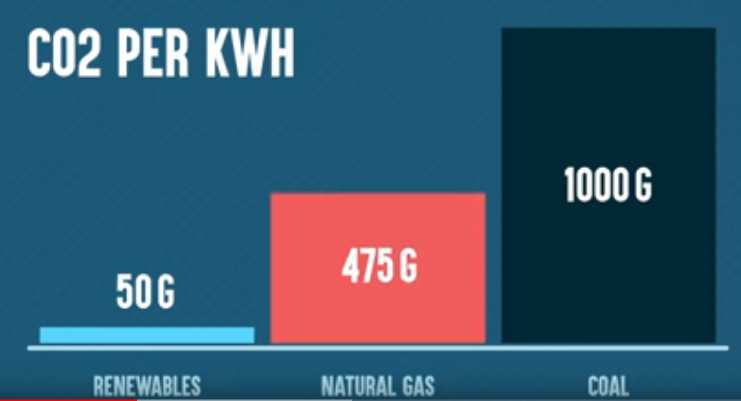
Is there any depth of dishonesty the rich and
powerful will not go to to twist the truth so that the solution
looks like a worse problem than the problem it solves? This fake
"information", so obviously put out by the "big oil" and nuclear
power lobbies on behalf of their ultra-rich owners, shows that one
must always use one's own careful discernment and check suspicious
sounding claims with other sources before accepting them. Even if
these claims are repeated over and over as if they were true.
Here is an interesting video on that subject:
How the media distorts the truth
by "Thoughty 2"
https://www.youtube.com/watch?v=BgQ79evjylc
In Passing
(Miscellaneous topics, editorial comments & opinionated rants)
USA:
Corrupted Processes and the Pressing Need to Evolve Democracy
Who actually won the
recent US election? A great many average Americans have become
pretty fed up - not to say disillusioned and cynical - about the
way things have been going. For at least the last three decades,
no matter who they vote for, nothing changes. Without an enemy
anywhere in the world after the fall of the Soviet Union in about
1989, increasing wars and ever increasing debt have been foisted
upon them to benefit big oil, the weapons industries and the whole
military industrial complex, big agra, big chemie, big pharma, big
banking -- all manner of big corrupt corporations and interests.
None of this - in fact nothing being done by government for
decades - has been to the benefit and uplift of the American
people or society. Instead it has progressively curtailed and
barred legitimate personal and business freedoms, initiative and
options, and increasingly 'misundereducated' and impoverished the
citizenry. This has reached the point of almost outright looting
of the wealth of the great majority of the population and reducing
"the middle class" to economic serfdom to a tiny ultra-rich
so-called "elite" (and this year, further reducing them to
economic superfluity). And the military aggressiveness has scared
and angered other nations, fostering arms races abroad.
Has meaningful change become impossible? The whole
system has been gamed from behind the scenes by the ever more
corrupt and entrenched "DC establishment" - the "beltway crowd",
"oligarchy" or "cleptocracy". They have controlled the narrative
and taken over the whole political process including the
nominations processes, putting up candidates Tweedledum and
Tweedledee for citizens to choose between at each election. Who
wins is largely of concern to Tweedledum and Tweedledee themselves
and perhaps to factions within the oligarchy, not to the nation at
large, because both of the potential winners (all other candidates
being very effectively barred) have pledged their wholehearted
support to the power brokers in order to be chosen for nomination.
Those power brokers are a whole team consisting of corrupt
top-position civil servants and judges appointed by the corrupt
processes, corrupt corporations who have the corrupt politicians
and government appointees on their boards, and a well paid,
corrupt media as a propaganda wing that Joseph Goebbels would be
envious of. Surely no one could gain high political office without
the backing of this gang. There was some good talent in the
"Democrat" primary, which was ignored as the corrupt puppet was
railroaded through. (The media would do things like insert a chart
on the screen in front of those people when the candidates were
together, and never mention that they were pulling big crowds or
had done really well in some state. In fact, never even mention
them or their thoughts and ideas. Ron Paul, by far the most
popular person there, got the same treatment in the "Republican"
primaries in 2008.)
So it is never individuals running for the great
office to set the course of the nation. It is a great host of
corrupt, mostly unelected individuals who predetermine who will be
permitted to be their mouthpiece. And this situation has more and
more prevailed for decades.
For example, even in the 1960s and 1970s Richard
Nixon would do the bidding of the oil gangstas, so they helped him
win the presidency in 1968. (Probably one of their moves, without
involving Nixon himself, was having someone shoot the favorite to
win, Robert Kennedy.) For about 5 years he did their bidding,
maintaining the Vietnam war (in spite of having promised to end
it) and keeping a threatening international attitude. Then he had
some sort of epiphany, apparently in the Lincoln Memorial talking
to some college students. He ended the war, gave long overdue
diplomatic recognition to China, and started arms limitation talks
with the Soviet Union. I was astonished that he had ended the war,
but he didn't seem to get much gratitude for it from anyone.
(Thank you, Richard!) His backers were furious. Dirt about the
election that would doubtless never have surfaced otherwise was
soon paraded in public view and dominated the news above the good
things he was now doing, and well before his second term expired
he was hurled from office.
Today, for an outsider to the whole corrupting
process to win at any time would be incredible. It would have to
be someone who was already well known, who was so rich himself he
didn't need their support, who would hire his own security staff
and be the best protected presidential candidate in history, and
who could somehow break through as the candidate for one of the
two political groups who could win. He would have to be
flambouyant enough to capture peoples' imagination, and he would
have to be a real fighter with a keen understanding of, and
counters to, the strategies being employed. Some of these
characteristics might not be seen as ideal for a national leader,
but that would be the only sort of individual who might prevail
against the whole Washington insiders' "club".
And winning the presidency would only be step one in
trying to end the oligarchical rule. He would then have to start
clearing out the upper echelon members of whole corrupted legal
system, both the enforcement arm and the judicial arm, before any
other "housecleaning" was possible. Those put into their positions
by the DC establishment would never decide to prosecute or convict
those who put them there - or themselves. And the corrupt congress
has to ratify the choices for key positions. Why would they allow
such a president to surround himself with uncorrupt outsiders to
their club? (Dr. Paul Craig Roberts, then deputy treasury
secretary and cocreator of "Reaganomics" has said they hampered
Ronald Reagan and prevented him from accomplishing things he
wanted to do by forcing him to choose "their" people who didn't
like his agenda.)
He would be up against the entire media propaganda
machine and the entire DC establishment, who would see having the
American people electing any politician to the highest office to
make decisions they hadn't formulated and agreed to as the most
extreme threat to their hegemony, wealth, power, position and
influence. And indeed considering their many shared and individual
illegal and immoral acts to obtain and retain those high positions
and their wealth, also their freedom from prosecution, possible
jail time and ultimately perhaps their lives, treason against the
Constitution being an executable offense. They would therefore
have no hesitation in using all their power, money, influence and
craft in repeatedly, remorselessly, loudly and publicly ridiculing
and demonizing such a president, proclaiming white to be black and
black to be white, and to accuse him of the very acts and
attitudes they themselves are guilty of.
(Trump's almost first move in February 2017 was to declare
corruption to be a national emergency and take certain measures
against corrupt fortunes. The nation was never told of this by the
media AFAIK, and I suspect that to this day most people haven't
heard of it.)
And here is the largest issue that America can ever
face: if all that manipulation should fail, if there was no other
way to retain their hegemony against the citizenry within even a
heavily rigged democratic fašade, why would they stop short of the
ultimate betrayal of every democratic principle their nation
stands for: rigging a critical election in their own favour? With
that, American democracy, whether or not its form is continued or
discontinued, would be at an end. The oligarchy will claim every
election thereafter in their favor and will have reserved
unbridled and unchallengeable power completely to itself, forever.
Is all hope for a freer and better world being dashed before our
eyes?
On the other hand, they have laid down the gauntlet.
If they can't take control of the country, arrests of the chief
election fraudsters, even many individuals, are likely. The
general in charge of the military operation in Germany
(Frankfurt?) to seize the "Dominion" voting computer that all the
others evidently reported to, under control of the CIA, has said
there will be shocking revelations. The fact of the existence of
this office, placed far from American soil, and the need for a
military raid, perhaps shows how far reaching and well organized
the whole election fraud plot was. (Evidently this high-stakes
raid had military casualties. The "Cocaine Importing Agency" isn't
used to being on the wrong end of a covert operation, and these
people probably had orders to protect the computer at all costs.
Has the CIA ever done anything good in its entire seven decade
existence?)
Perhaps the election fraud moves were anticipated and
watched even before the election, and a trap has been set. (How
did the military & presumably the white house know about the
seemingly crooked vote counting operation in Germany?) If that
happens, this may be the present 'oligopoly's last stand. That
might provide a breathing space of a decade or two, maybe even
three, before a new band of opportunists has filled their places
-- a breathing space in which to make structural changes, to
evolve democracy to a new level that will prevent any future
repetition.
(Now I hear that they had already been "subtly"
rigging elections, at state levels too. Usually shifting the
result by perhaps 5 or 10 or 15% makes the difference. In 2016
that evidently wasn't enough, resulting in an ending that was
obviously a shock to the "impartial" newscasters covering it. One
could see the incredulity on their faces and disappointment in
their voices, on every "mainstream" news channel covering the
election, as their anointed queen was outvoted - and so probably
in actuality quite heavily outvoted - across the country. A video
on youtube shows all these distraught media persona reactions in
one place. In 2020 more blatantly obvious methods of fraud had to
be employed to secure the desired outcome. Apparently a
considerable majority of the American public just aren't buying
the stories any more.)
Here I have identified my opinion, my perspective on
what is happening and what has been happening for decades, derived
from how everything has been unfolding and all that I have heard
or seen said. Obviously if one believes the election was fair and
honest, and the the winning candidate isn't a despicable criminal,
who was chosen to be a willing puppet to the "deep state" behind
the scenes, one will have an entirely different impression than
mine. Both views are certainly sustained by many millions of
people, and obviously they are mutually incompatible -- one is
surely more or less right and the other wrong or highly
exaggerated.
But let us step out of the box. What are the
underlying causes that have given rise to this all-around
unsatisfactory situation; what needs to be changed so that the
situation will be modified and evolve in a favorable manner?
1. We should acknowledge that our democracies are primitive,
unevolved. In many regards they may be thought of more as
"rotating dictatorships" than than the ideal of "rule by, for and
of the people". A couple of hundred years ago, that was a big step
up, and truly the big step up, from authoritarian rule by
self-chosen monarchy or dictatorship. It was good enough for the
time, and maybe as good as it could have been. The public at large
had much less interaction with national government and were mostly
more concerned with getting in their firewood and food for the
next winter. Public schools for all were a new idea from Scotland.
But why has so little of government framework changed since then?
Has democracy become a dinosaur that simply can't evolve into new
forms to adapt and thrive in changing social conditions?
2. The first problem in detail is that those elected to govern
gain power under the current system, whatever it is. Most of them
want power and influence and have no interest in changing what
worked for them, fostering political progress, or in sharing
decision making power with other concerned citizens within the
populace. They want to impose their will on society, sometimes as
they may truly believe it will be for "the greater good",
sometimes for baser reasons. But in our current "top down"
systems, nothing significant is approved except by decree of the
national leader. If no one can hammer it onto his agenda - and no
one person can possibly deal with everything - either decisions
are made privately by unelected persons behind the scenes or it
doesn't get dealt with at all.
Thus the "political class" soon come to have a
conflict of interest with the citizenry they are supposed to
represent as well as with those who realize that change is needed,
but who rarely gain the political power needed to make such
changes. The adept politicians can outmaneuver them in public
posturing and win the elections with ease. A program to make
subtle changes to the way things are done, rather than to promise
'great' things, has little appeal in an election.
Canada's present leader promised to change what I
call the "illiterate's "X"" single choice voting system, but
scrapped the plan once he had power. BC voters apparently didn't
grasp the benefits anyway and rejected the similar free offer of
improving the provincial system. Even so, these very desirable
improvements to the voting systems, which will (someday) finally
be implemented after producing a century and more of transparently
unfair election results, were not the sort of major structural
changes that would bring democracy back from its gradual but long
continued decay to new levels of "bottom up" progress and
refinement. So things have stayed largely the same for a couple of
hundred years, stuck in one place -- amidst continual and
cumulative societal growth and change. Only when something has
clearly failed is some half-measure applied to try and shore up
the dam.
3. Revolution (as in USA) or the threat of revolution - (as in the
reform bill of 1831(?) that passed in British parliament by just
one vote (IIRC) out of over six hundred cast, even with all the
cogent arguments brought forth for it and the urgent threat of a
potential "French Revolution" in Britain) - brought us democracy.
Democracy is the only form of government that can grow and
adapt over time. That doesn't mean that it will do so, but
no other form can. If democracy fails to evolve and adapt, it will
be gamed more and more and become more and more corrupt. Sooner or
later it will fail. The result of a revolution in a democratic
state would probably be devolution to authoritarianism and
dictatorship. "We tried democracy. It didn't work." It might be a
hundred years or more before it would be tried again. Civilization
with personal liberty, safety and protection from unjust treatment
by government would probably collapse and a new dark age would be
upon us. (Legislation for meting out unjust treatment with no
recourse to citizens was passed in the USA's "NDAA", "Patriot Act"
in 2001 and further actions, and has been employed.) "Dangerous
radicals" who wanted liberties back might just start disappearing
like in Pinochet's Argentina and so many other regimes. (Hmm, is
it not already happening? What about the fatal sabotaging of
journalist Michael Hastings' car in 2012 when he e-mailed
Wikileaks that he had an expose on the CIA coming up? Murder of
the doctor claiming a cure for autism with his body turning up in
a river in another state?)
4. So the first thing that needs to change is to gain the ability
to make changes when and as required, without a revolution. How is
this to be accomplished? Unfortunately there is no obvious
solution to this today. Every civilization that has ever existed
on this planet has failed and passed into the history books. And
it is not what they have done that has been their undoing, but
what they have left undone. Corruption and cronyism crept into the
ruling circles. Their institutions, laws and societies, trying to
maintain a "status quo" that was no longer useful, failed to make
the evolutionary changes to the way things were done that would
enable them to adapt to new needs and conditions.
But "The Most Highs rule in the affairs of the
kingdoms of Men", and "All things work together for the progress
of men and angels." Global circumstances are lining up to promote
changes that would never be permitted by the 'authorities' and
institutions that have held sway for a century or two. We have
tremendous problems building up, far beyond the capacity of
present day "top down" governments to deal with, and the time is
approaching when people will, in utter desperation and with
individuals everywhere wondering it they'll be alive next week, at
last, start looking "outside the box" for meaningful "bottom up"
community-based solutions and trying out things that they would
never have considered before.
5. "Nature abhors a vacuum", and where there is a power vacuum,
those seeking power will tend to fill it. A swamp will not form or
fill without a depression in the ground to hold water. In
principle then, much of the power should be distributed,
delegated, with citizen oversight. Power and vacuums of power must
be recognized, and some institution must be created to handle that
power in a way compatible with the core values of being human,
with the morality and ethics that spring from them.
Some people have said "The government is the
problem." and they are to an extent right about current
governments. But their solution, to get rid of government
entirely, is entirely unworkable. That would create the worst
possible power vacuum - of national leadership - which would be
fought out by rival gangs and factions until one would assume
absolute power, and by no means allow everyone to live the life of
freedom and peace they naively envision. The thugs of the slave
masters would tell everyone what to do at the point of a gun.
One of the most sacred duties of government is to
protect everyone's freedom by not allowing any one person or
entity to infringe upon the rights of any others. The fact that
this is being done so badly today is perhaps an indication of how
close we are to societal collapse.
6. To recap, the primal values of being human may be considered as
being:
- Life
- Equality
- Growth
- Quailty of Life
- Empathy
- Compassion
- Love for Humanity
One could perhaps employ a different word or two,
perhaps say that empathy and compassion are the same thing or go
hand in hand, but expressing them as these seven core values seems
good. Aside from life itself, they divide into three primary
values and three secondary. The three primary ones have created
civilizations. But all are necessary to build a sustainable
civilization that will adapt over time and never collapse as long
as the world and people exist.
7. A chief societal problem is that while we as humans all have
these values in the very DNA of our beings and we intrinsically
know right from wrong, they are not automatically inherited when
we create an organization or institution. Unless the new entity is
formed from the start with the specific intention to
uphold these values, they become supplanted by subsidiary, derived
values. An enterprise values "profit". Why? To improve quality of
life, of course! That's where it's derived from.
But whose quality of life? Just the shareholders? and
the executive? giving the workers as little as possible? and
giving the customers as little as possible for their money? Who
are the real shareholders of a company - just those who have
invested dollars, or everyone who has helped build it, even the
customers who value the products? Core values, at least of
equality, empathy and compassion are lost by in the search simply
for "profit" for the dollar investors and the corporate
executives. Other examples of institutions in government,
education, health and so on working for secondary values may be a
bit less obvious, but they are not wholeheartedly working for the
benefit of their society.
With every institution seeking its own advantage vis
a vis the citizenry and against others, in alignment with their
secondary values, more and more there is no "free world", no
Canada, United States, Europe... instead there are a bunch of
competing factions and "Our Society" as a whole is less and less
perceptible. Fewer and fewer identify with what they perceive that
to be, and more and more with their faction.
8. One way to help eliminate power vacuums today could be with
concerned citizen "Design Teams", each one constituted around a
single "issue" or topic. Our communication and transportation and
"leisure" time are now such that such teams could easily meet on a
regular basis in members' homes to hash out options and solutions
to things that don't seem to be working out and need changing or
even initial organization.
But such teams in different locations would be in
contact with each other through the internet, and the solutions of
each team would be subjected to an overall consensus process. A
final consensus would be presented to government for action. This
would be more powerful than lobbying by corporations and suchlike
as they would be recognized as the selected best solutions of the
entire concerned citizenry as a whole. Uncooperative and
unqualified members of governments would be recognized as such and
others who would be a part of the process would take their places,
as less theater and posturing, and instead more unbiased
information about the candidates, their views and their
qualifications will start to become known before and during
elections. Again the internet will play a major role in this
shift. (I'm expecting it in the coming decades, not overnight --
but that's not impossible either.)
Perhaps the best available reference to this new idea
of organizing such teams as part of "bottom up" or "third stage"
democracy is in Daniel Raphael's papers on The Design Team
Process:
BigMacSpeaks.life/daniel-raphael-papers/
Raphael also speaks on other topics to help make the
world more socially self-sustaining, such as means for evolving
our democracies to this new "3rd stage" with far more involvement
by concerned citizens.
9. Some powers should be decentralized, in order that community
decisions can be made within a community rather than at a state or
federal level. Making lower level decisions at a higher level
results in decisions that can't be tailored to each individual
community, and so levels of dissatisfaction are obtained outside
the most populous community.
I'm not sure I've really done this subject justice.
I'll probably recur to it in the future. But I felt a need to
address it at this time so here it is, and I hope that designers
of future society will find some of these ideas and information
useful.
Efficacy
of Ivermectin for Treating CoViD19
The first lab study and
hospital uses of Ivermectin (AKA "Stromectol") last spring weren't
just "out of the blue" as it was already known to be effective
against some viruses. Since last April or May it's been apparent
that Ivermectin is a fabulous medication against CoViD.
Now, here's a chart of the essential results of a
recent study in Egypt of 400 hospitalized CoViD patients,
comparing Hydroxychloroquine versus Ivermectin. I won't go into
great detail here except to say that no supporting administrations
such as vitamin D or zinc were given, and that the dosage of
Ivermectin used was double the norm given for parasites. Dr. Chris
Martenson (PeakProsperity.org) mentions more details in his video
"USE THIS ONE WEIRD TRICK" on youtube. (The obscure "click bait"
title is to keep youtube from shadow-banning it. He never mentions
Hydroxychloroquine by name in the video either, for the same
reason. He calls it "Dwizibin" instead - After all, Youtube can't
have ignorant people - especially medical doctors reading from
actual clinical studies - spreading misinformation about medical
topics of great concern and interest to all. If they persist,
delete their channel with all their videos, even many years' worth
of them, without warning. It's happening a lot lately. Discussion
of controversial subjects is all but banned. Freedom of speech is
always permissible in a closet, but not where there might be an
audience!)
|
100 Less serious patients -
given Ivermectin
|
100 Very serious patients -
given Ivermectin
|
100 Less serious patients -
given Hydroxychloroquine
|
100 Very serious patients -
given Hydroxychloroquine
|
Recovered
|
99
|
94
|
74
|
50
|
"Progressed"
|
1
|
4
|
22
|
30
|
Died
|
0
|
2
|
4
|
20
|
Remember that these were all people sick enough to be
hospitalized, not the many who got it and recovered without major
issue. Doubtless the death rate would have been still higher
without hydroxychloroquine, but every instance has shown that
Ivermectin is far better, especially in later stages of more
serious cases.
(The chief American medical bodies have now
recognized (or is it "finally admitted") that Hydroxychloroquine
is helpful after all -- even if President Trump was telling
everyone all along that his doctors said so! Still nothing at all
is recommended on the CDC's CoViD information page either for
prevention or treatment. No mention of Ivermectin.)
The study also had two more groups of 100 each:
health care workers in the hospital. Of those who were given
Ivermectin (along with all other precautions), 2 got CoViD, and of
those who weren't, 10 did. (And again there was that Toronto
nursing home last March where the residents were given ivermectin
for another cause, weeks in advance of the onset of CoViD
decimating other nursing home populations. In that home few
residents caught it - just many of the staff.) So it also seems
quite effective as a preventative. So while everybody sits around
yearning for an effective vaccine to appear before they try to get
on with their lives, there's already a safe, cheap, easy to
produce pill that is probably at least as effective as any vaccine
that might be hastily constituted in the early part of this
decade. The Egyptian study is just one of many instances showing
how effective Ivermectin is.
And a virus vaccine (as opposed to a bacterial
vaccine) probably won't be a miracle anyway. Lots of people who
take influenza vaccines every year still get the flu, and it's a
running battle of trying to keep up with 'mutations' of the flu
virus that continually require new vaccines to be developed. If
only temporary immunity is obtained anyway, it might as well be by
a pill.
Perhaps worthy of note: Before Ivermectin's value was known, it
was said there was a shortage of Hydroxychloroquine. (so don't
even think of asking for it, eh!) At the start of the epidemic a
lab in Greece ordered raw materials from India and made 24 million
doses of Hydroxychloroquine in one weekend. Apparently the USA
can't manage anything like that with either of these cheap, easy
to produce medications. So any shortages are apparently self
inflicted. Nor (last I heard), in spite of its proven
effectiveness around the rest of the world, had the USA even
started any 'official' clinical trials with Ivermectin that would
get it approved for general use for CoViD in the western
democracies. CoViD death rates per million in "third world"
countries that have no hesitations about using Ivermectin are much
lower than in the USA. (...which I heard has the highest "deaths
per million" of all nations!) To be fair it must also be noted
that these "low-CoViD" countries mostly have warm climates and
people aren't congregating indoors in buildings with closed
windows and recirculating ventilation.
So: After telling everyone how serious CoViD is and
making a really big deal of it, destroying the whole economy and
the food chain and issuing trillions of dollars in bailouts, now
for nearly a year (nearly 1/4 of all existing US dollars were
issued in 2020)... let us make not the slightest haste about
telling the public about the safe, effective and known
preventative and cure, or offering it -- even to those who have
the disease or are at high risk of getting it!
* See no
Ivermectin
* Hear no Ivermectin
* Speak no Ivermectin
* Tell the public we're all waiting anxiously for a pricele$$
miracle vaccine
that may be half as effective against CoViD19 as Ivermectin
already is.
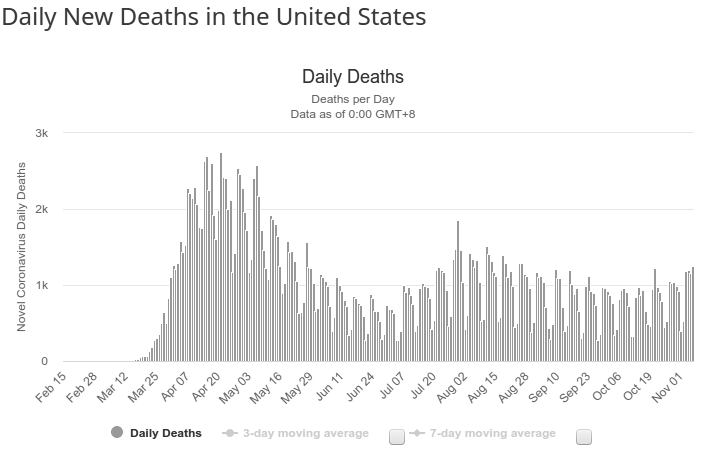 Owing to the "alarming
increase" in CoViD-19 cases, many US states and
Owing to the "alarming
increase" in CoViD-19 cases, many US states and
Canadian provinces, and many European nations, are locking down
again!
But in many of them, the death rate is very low and hasn't
risen.
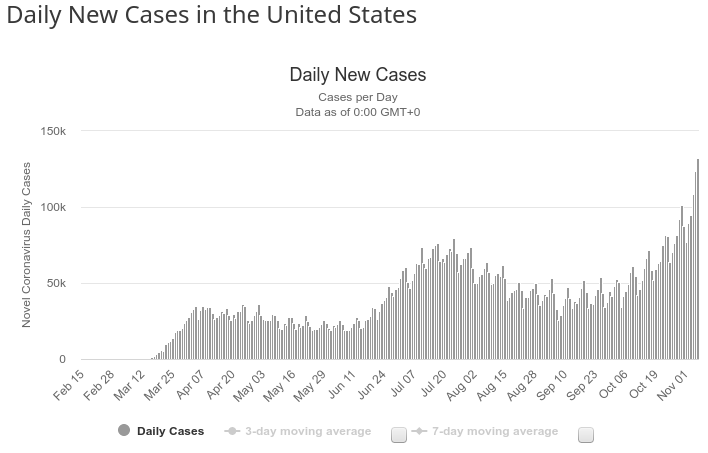 Once again, the "new
cases" statistic probably includes more of the 2.5% false
Once again, the "new
cases" statistic probably includes more of the 2.5% false
positives, inevitable from testing tens of millions of people,
than real cases.
And why aren't all of the positive tested people, those at
higher
risk, and those who are in fact ill, being offered Ivermectin?
How close to being criminal is it that they aren't?
Instead whole populations endure lockdowns, business
closures and other edicts with increasingly severe enforcement and
increasing death rates both from CoViD and from many other
restriction and lockdown related causes. People are suffering more
and more from the effects of these draconian measures. Something
stinks. To high heaven. We're being led or shoved into
authoritarian dictatorship by the media and a hundred would-be
tin-pot dictators in many states and nations, who actually seem to
care nothing about our freedom, health and lives, more excited
somehow about abusing and wrongfully extending their authority far
beyond reasonable limits. They seem willfully blind to any
direction available except what fits their authoritarian agenda.
With cheap Ivermectin freely for sale in drug stores
(and of course with the public being told about it!), we would
surely be free of CoViD by now except for occasional individual
outbreaks which would be quickly quelled, and at the very least
free of its worst effects of severe illnesses and deaths, and
devastating economic disruptions.
While this virus, endemic to bats, somehow got passed
to humans, in the west the societal reaction to that has been,
like the body's "cytokine storm" reaction to the virus itself,
highly overblown and highly inappropriate. It would seem that
those who call CoViD a "plandemic", are wrong as to fact (we
trust), but not without justification for their outrage and
protests.
---
All that said, CoViD-19 isn't the first newly
appearing disease to start killing people in recent times, but it
is the first pathogen that has both jumped the species barrier
from some animal and then also spread uncontrollably among humans,
making a pandemic. Our population being so large and dense, there
will be a much worse pandemic(s) in the coming decades, killing
billions, until a balance with nature is restored. With world
travel having ground almost to a halt, it will probably spread
considerably more slowly than CoViD did. ...unless there is a long
lull in which widespread international travel resumes. If CoViD
had had a high mortality rate to match its high contagiousness,
our population would have already been significantly reduced.
(Even now it seems that a second strain of CoViD has emerged. So
far neither has had a high mortality rate and Ivermectin seems
effective on both.)
Gardening & Chickens
There's not a lot to say about gardening now as
winter sets in and there are just a few bunches of swiss chard
showing, plus oodles of potatoes still in the ground. I have
started up the LED indoor garden but not gotten very serious about
it. (Maybe if I want greens later this winter I should!)
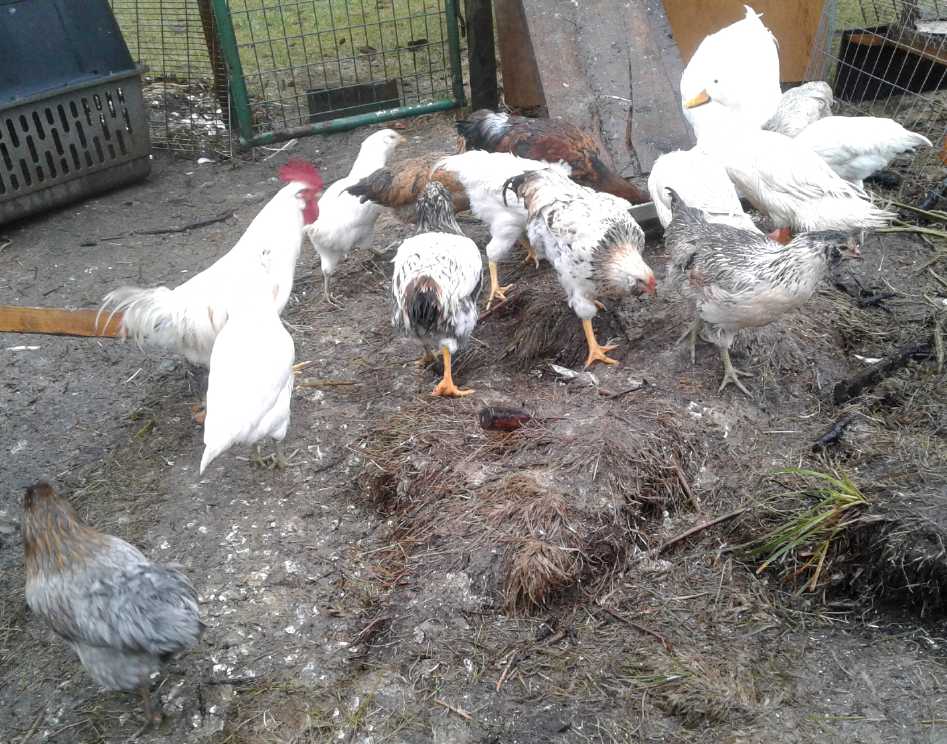 My original rooster and hen
are farthest left, a bit stand-off-ish.
My original rooster and hen
are farthest left, a bit stand-off-ish.
The white turkey has its head in the feed trough with the white
ducks in front of it.
Somehow I got 10 of the 11 young chickens in the picture. They
weren't cooperative posers.
I inherited a flock of 11 young chickens, two peking
ducks and a turkey (as well as a huge pile of boxes of mostly
useless "stuff") when my renter came with them and then moved
again. They are trampling my new fenced-in large garden. It's
great having the weeds eaten and the ground fertilized, but I must
get them out before spring. Perhaps the old fenced garden
"meadow", unused for many years because alder trees have grown and
shaded it out, would be a good place - just some fence to repair.
(After the carport... After the outbuilding... After at least a
couple of the more promising green energy projects... But before
spring!)
So far they all look like hens to me. But in the next
two or three months they should start to show their true colors.
and start to lay eggs. What will I do with all those eggs? I guess
I'll have to get someone to sell them for me at the farmers'
market. Or just advertise them very locally and do self-serve from
my driveway?

 Why are this apple tree's leaves
turning yellow (25th)? They were green (12th) until half way
through the month. Where was that chart I put in an issue or two
back, showing what minerals might be lacking based on the patterns
and colors of the leaves?
Why are this apple tree's leaves
turning yellow (25th)? They were green (12th) until half way
through the month. Where was that chart I put in an issue or two
back, showing what minerals might be lacking based on the patterns
and colors of the leaves?
Okay, the real question is: Why does it still have
leaves in November (and even into December) when other broad leaf
trees are bare? The cherry tree nearby has been bare for a couple
of months.
But even more... why doesn't it bloom in the spring?
I want apples, but I'm not getting them.
Small
Thots
* Carbonated Beverages and Tooth
Decay
In a recent issue I stated that I thought the prime
cause of tooth decay was carbonated beverages. This was based on
some observation of others I knew well plus unfortunate personal
experience. I went for many years without eating much sugar and
mostly without drinking carbonated beverages, and had few
cavities. Then I drank quite a bit of rootbeer for just a couple
of years and needed a pile of fillings in my teeth. (mostly
between most of my teeth because I wasn't flossing much, but that
wasn't much change of lack of tooth care from before the
rootbeer.) Since then I've gone for many years eating lots of
sugary things, but pretty much avoiding carbonated drinks of any
kind, and having very little further tooth trouble. I do now
always floss and run the little plastic/rubber toothpicks between
my teeth along with brushing before bed.
But it has occurred to me a better reason than simply
the acidity of the CO2: It's also a gas, bubbling out of the drink
including in the mouth, and I would suppose it penetrates deeply
into tooth enamel, its acidity at least weakening or softening it,
and perhaps rendering it more vulnerable to bacteria.
* Gold "Confiscation"?
When considerable numbers of average persons might do
especially well over something, government has a longstanding
habit of changing the rules in mid stream.
In 1931(?) in the USA, the US dollar was being
shunned. Gold was "confiscated" to make the dollar more popular by
eliminating the alternative. No one was allowed to own more than
one troy ounce. Having more was punishable by law. (I understand
jewellery and "collectible" items like old gold coins were
exempt.) The rest had to be sold to a government approved bank for
about 20 $/ozt. Lots of people had their savings in gold coins, as
it was essentially inflation proof. Newspaper ads and articles
insinuated that you weren't patriotic if you didn't turn in your
gold, and you couldn't visit your own safety deposit box in a bank
without a federal agent accompanying you. (The rich moved their
gold to other countries in advance.) As soon as the government had
it all, gold was repriced to 35 $/ozt. Thus the whole population
essentially had been gypped of around 43% of their wealth held in
gold, to fund the government and prop up the dollar. The Great
Depression with its poverty and starvation ran until the end of
the decade - ably assisted by the "dust bowl" years when it was
too dry to grow crops over a large agricultural area.
People talk now about the growing financial and
economic crisis and the potential for gold confiscation. Some say,
"But far fewer people own any. Why would the government bother,
and how would it help anything?" But gold has been flying off the
shelves of late. I found a video on the subject.
The author thinks that today "confiscation" would be
done through taxation. It is simple to track sales to bullion
dealers, and any sales that happen via the internet, and those
have become the majority of sales. As gold "heads for the moon" in
price (really meaning that paper currencies are hyperinflating),
all profits from gold sales would be taxed at a very high rate,
eg, 90%. Thus the benefit of anyone holding gold would accrue to
the government instead of to the person who bought it. Probably
only gold would be accorded this treatment - and probably, if it
does happen, at or soon after the "reset" scheduled for late
January 2021. Best to have some silver (and or any other valuable
metal ... platinum ... iridium ... dysprosium ... ?) instead, or
in addition?
* The "propaganda media" has a way of saying things which too many
naive people 'swallow'.
Trump: "I hate the KKK. Since I was 5 years old." (He did say
that.)
Listener (with irony): That's pretty strong language for a
supposed 'white supremacist'!" (This I made up...)
Media reporting: "Commentator says white supremacist Trump uses
"strong language." (...but it seems typical of the way the media
twists things to push their 'narrative'.)
* The food shortages about to strike, mentioned in the CoViD
article above, will be partly due to all the farm, ranch and
intermediate food chain shutdowns this year, as well of course as
to the devastating global crop failures of the past two years.
Famine will claim orders of magnitude more victims than CoViD has.
In the West no one in authority is paying that any attention, and
food concerns when mentioned at all are downplayed and blamed on
"hoarding" by people who are facing yet more heinous lockdowns.
(...more lockdowns in spite of the WHO having changed its mind and
decreed that they are counterproductive.)
All across the USA hordes of people who until
recently were working productively now line up for hours at food
banks to get groceries for a few meals. And by December grocery
stores have increasingly had empty shelves and more difficulty
refilling them. It's easy to prophesize that the breaking point is
not far off.
I've seen comments under youtube videos of people who
are happy they have 2 or 3 months worth of food put away. The next
major harvests, however, will not be in January or February. We
have just passed harvest time. (Harvests?... by all those
bankrupted farmers?... with their labor forces disrupted and
dispersed by CoViD measures?... in the increasingly chaotic
weather seemingly caused by 'global warming' and the extended,
long-lived jet trails in the stratosphere as well as the grand
solar minimum?)
ESD
(Eccentric Silliness Department)
* Sometimes in winter small animals like cats, squirrels or birds
discover that the hood of a recently driven car is still warm for
quite a while and sit or even sleep on them. Amusing!
* Ideology: Philosophies of ideots.
* If dividing zero by zero makes no sense, why do we have a
special symbol for it: % ?
* Vladimir Putin has declined to congratulate Joe Biden on his
election victory until the lawsuits are settled and the final
verdict is known. Asked if that might damage Russian-American
relations when so many other leaders have already congratulated
Biden, Putin replied "There's nothing to damage. They're already
ruined."
I thought that was as hilarious as it was true!
When's the last time you heard any American spokesman say anything
good about Russia? And of course if Trump is finally declared the
winner, aren't all those other "so hasty" leaders, falling all
over themselves, who thought the media decides elections, going to
have egg on their faces? Will it hurt their relations with
America?
* Shouldn't a storm named "Andrew" be called a "Himmicane"?
* With all the people who can't pay their mortgages, we will soon
be moving out of the realm of foreclosures and into fiveclosures,
tenclosures, and foretyclosures.
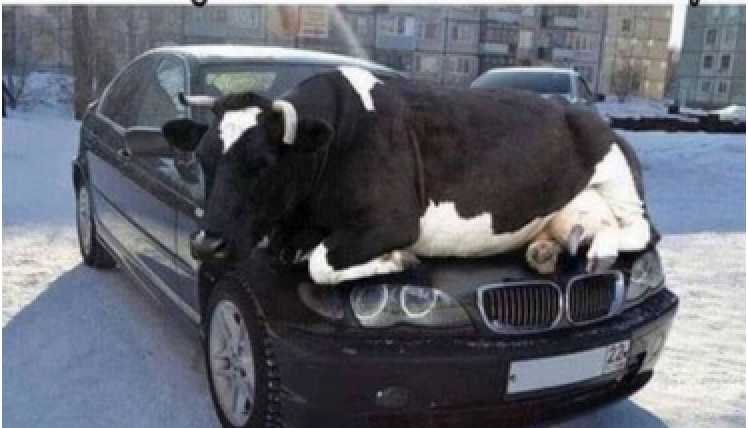
"in depth reports" for each project are below.
I hope they may be useful to anyone who wants to get into a
similar project, to glean ideas for how something might be done,
as well as things that might have been tried, or just thought of
and not tried... and even of how not to do something - why
it didn't work or proved impractical. Sometimes they set out
inventive thoughts almost as they occur - and are the actual
organization and elaboration in writing of those thoughts. They
are thus partly a diary and are not extensively proof-read for
literary perfection, consistency, completeness and elimination of
duplications before publication. I hope they may add to the body
of wisdom for other researchers and developers to help them find
more productive paths and avoid potential pitfalls and dead ends.
Electric
Transport
Ground Effect Vehicle (1/4 scale model)
[3rd] I had been searching for my TI Launchpad MSP430 development
board that had one of my 1980s "Display-Controllers" attached,
last used 2018. Finally I started looking in earnest - it had to
be somewhere. A couple hours turned it up. So often my
projects (energy and other) turn into a search for something!
Then I arbitrarily assigned (as they were all
connected next to each other on one header pin strip):
port 1:6 = up and down 'throttle'/power control - input 3
from radio control receiver
port 1:7 = side to side 'steering' control - input 4 from
radio control receiver
port 2:4 = Left Ducted Fan - output to its 'ESC' Motor
Controller
port 2:5 = Right Ducted Fan - output.
That left the other header strip free for the
'display-controller' so I could program it to show just what was
going on. (Then I had to get on to something else and didn't get
back to it.)
Other
"Green" Electric Equipment Projects
Small 3D
Printed 12 Volt Panel Lights
 [25th]
While I had started with some aluminum plate chunks to back LED
COB flat lights with, I had found that owing to having few and
short fins, the plates gradually got quite hot. So having gone so
far as to design a 3D printable case in OpenSCAD, I ordered some
finned heatsinks that were just the right size. When they arrived
I incorporated them into a new, slightly smaller LED COB panel
light. I printed a couple and liked the second one.
[25th]
While I had started with some aluminum plate chunks to back LED
COB flat lights with, I had found that owing to having few and
short fins, the plates gradually got quite hot. So having gone so
far as to design a 3D printable case in OpenSCAD, I ordered some
finned heatsinks that were just the right size. When they arrived
I incorporated them into a new, slightly smaller LED COB panel
light. I printed a couple and liked the second one.
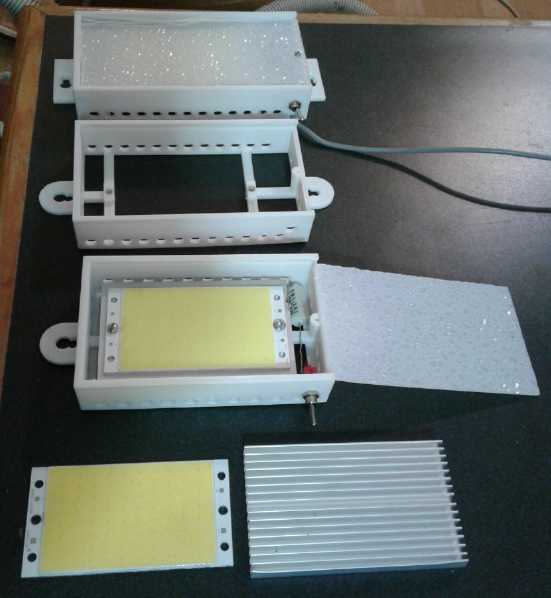
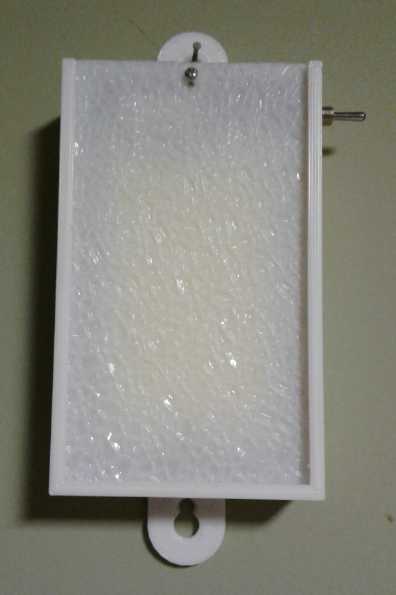 Notwithstanding that it was a very small project to assemble the
light, I did it in dribs and drabs over a couple of weeks,
finishing on the 25th.
Notwithstanding that it was a very small project to assemble the
light, I did it in dribs and drabs over a couple of weeks,
finishing on the 25th.
My next thought was it should have a fuse in case
it's plugged into too high a voltage or something. I didn't leave
room for a fuse. Rats! (Might still squeeze one in.)
Hmm... I picked #6-32 size for the mounting bolts. It
would seem 1/2" is too short and 3/4" is too long, sticking out
the back. Need exactly 5/8" - the size between that I don't have.
 It didn't
get as hot, even at 10 watts instead of 7. It's amazing how the
temperature just keeps creeping up from a few watts if the heat
isn't being effectively dissipated to the air. (Note: I could feel
some heat in front of the light as well as the warming heatsink.
Might heat yellow the diffuser?) Owing to the direction of the
cooling fins, if it's mounted on a wall the best orientation is
vertically. Putting it on "low" it was about 1.5 watts, and still
plenty bright, using a 10 ohm resistor. (1/4 watt resistor... I
wonder how warm that's getting? It must be almost 1/4 watt. I
don't have any 1/2 watt. Maybe I should try 15 ohms? 1 watt of
light is still a good night light.)
It didn't
get as hot, even at 10 watts instead of 7. It's amazing how the
temperature just keeps creeping up from a few watts if the heat
isn't being effectively dissipated to the air. (Note: I could feel
some heat in front of the light as well as the warming heatsink.
Might heat yellow the diffuser?) Owing to the direction of the
cooling fins, if it's mounted on a wall the best orientation is
vertically. Putting it on "low" it was about 1.5 watts, and still
plenty bright, using a 10 ohm resistor. (1/4 watt resistor... I
wonder how warm that's getting? It must be almost 1/4 watt. I
don't have any 1/2 watt. Maybe I should try 15 ohms? 1 watt of
light is still a good night light.)
[26th] I had used a 1.2 ohm (5 watts) resistor as the current
limit for "bright". But if it's 9-10 watts at 12 volts, what would
it be run off batteries under charge at say 13.5 volts? I decided
to drop the current and use a 2.0 ohm resistor. It can be 10 watts
at the highest voltage and drop to 5 watts as the battery weakens.
That's still enough to read by.
In future I may make it a little taller to get the
diffuser farther from the COB LED emitters. It's pretty glaring.
I may also revise the case design to include a DC to
DC down converter for operation from 15(?) to 36 volts.
[29th] I changed the "high" resistor to 2.0 Ω and the "low" one to
18 ohms. The idea of the unregulated supply for 'off-grid' is that
the power drops as the voltage drops, conserving the battery. I
measured and got the following results:
Supply Voltage
|
Resistor Drop 2Ω ("High")
|
Calculated
(Total) Watts
|
10.5 V
|
.098 V
|
0.51 W
|
11.0
|
.335
|
1.84
|
12.0
|
.98
|
5.88
|
12.5
|
1.165
|
7.3
|
13.0
|
~1.5
|
9.75
|
13.5
|
1.92
|
12.96
|
|
Resistor 18Ω ("low")
|
|
12.0
|
1.525 V
|
1.02 W
|
The target was to be around 7 watts, which target
area is achieved from 12 to almost 13 volts. But one sees that it
would probably be inadvisable to run this light for a long period
if the supply voltage is over about 13 volts. The COB LED is rated
for up to 20 watts, but with the limited heatsink it would get
pretty hot. These characteristics should make it a good light for
(eg) a solar powered system with a lead-acid battery, used at
night. Still the power drop with voltage is insufficient to really
safeguard the battery if the light is left on and forgotten for a
while. A distinct cutoff around 11.5 volts would do that better.
For a lithium battery that will sit at about 13 volts
or over, and will be higher when on charge, it might want a bit
larger resistor, maybe 2.5 or 3 ohms instead of 2.
Well, it works fine, but I think I've just made a
good argument in general for having a regulated power supply if
one is selling lights, so as to not have to worry about
exactly what batteries and voltages a customer might have. Maybe I
should put a DC to DC converter with adjustable current regulation
in all of them if I am going to sell them. And then there's just
one model for 12 to 36 volts. (Hopefully down to 12.0 volts, at
least. Maybe the DC to DC converters will accomplish the desired
power reduction below 12 volts?
The mini-T-Plug shells I made in conjunction with the
light are more generally applicable to any 12V appliance (assuming
I get people to adopt these nifty plugs and sockets for off-grid
use):

Electricity
Generation
My Solar Power System
Month of November Log of Solar Power
Generated [and grid power consumed]
(All times are in PST: clock 48 minutes ahead of sun, not PDT
which is an hour and 48 minutes ahead. DC power output readings -
mostly the kitchen hot water heater for some months, then just
lights - are reset to zero daily (for just lights, occasionally),
while the others are cumulative.)
Solar: House, Trailer => total KWH [grid power meter
reading(s)@time] Sky conditions
Km = electric car drove distance, then car was charged.
October
31th 1106.41,295.61 => 1.53 [55Km; 78045@18:30]
Rain.
November
01st 1107.24, 296.19 => 1.41 [78086@19:00] Morrain.
02st 1109.29, 297.23 => 3.09 [55Km; 78138@18:30] Sun and
rain. (even both at once)
03st 1110.75, 297.99 => 2.22 [78185@19:30] more rain, a
bit of sun or light clouds.
04nd 1111.41, 298.33 => 1.00 [78225@18:30] yet mor rain
and even less sun.
05AM 1113.26,299.17 => 2.69 [78271@20:30] sun, clouds,
no(?) rain.
06PM 1115.07,300.10 => 2.74 [60Km; 78326@18:00] Similar
to 5th.
07DST Oops! => [est. 4.00] Sunny all day. Rats, the one really
sunny day and I forgot to check the readings! Probably over 4 KWH.
08rd 1118.90,302.93=>[est 2.66] total for 2 days: 6.66 KWH
[78424@19:00] Partly sunny
09rd 1121.15, 304.57 => 3.89 [78471@21:00] Mainly sunny.
10th 1123.78, 306.61 => 4.67 [55Km; 78526@17:30] Sunny
and cold.
11th 1124.64, 307.08 => 1.33 [78580@18:00] cloudy until
late afternoon.
12th Missed another one! [est. 1.00] (Musta been the 3 hour nap +
long fone call) Trailer: 307.38(?) Cloudy.
13th 1127.01,308.26 =>[est. 2.55] total 2 days = 3.55
[78670@18:00] Some sun.
14LF 1127.58, 308.52 => 0.83 [55Km; 78747@20:30] Mostly
rain. High winds and storm overnight.
15MF 1128.62, 308.95 => 1.47 [78787@23:30] Clouds but not
rain. (Clear at dark - stars, heavy frost.)
16HF 1129.24, 309.32 => 0.99 [55Km; 78833@16:00] Clouds,
rain.
17VHF 1129.76,309.55 => 0.75 [78878@21:00] Clouds, drizzle.
18ch 1131.77, 310.96 => 3.42 [78909@17:00; 60Km] Sunny or
mostly sunny.
19AH 1133.32, 311.90 => 2.49 [78952@17:00] Scattered clouds
& jet trails.
20pF 1134.30, 312.41 => 1.49 [78991@18:00] Heavier
clouds, less sun.
21mF 1134.56,312.53 => 0.38 [79022@17:00; 55Km] Rain and
wind, dark... then a pink sunset.
22nm 1135.00,312.71 => 0.62 [79071@22:00] Clouds and
cold.
23th 1135.55, 313.01 => 0.85 [79105@7:30] Clouds and
rain. 7░.
24th 1136.76, 313.59 => 1.79 [79152@22:00] Couds and rain
with a couple of sunny breaks.
25K 1137.60, 314.01 => 1.26 [55Km; 79187@20:30]
Cloudy. Some rain.
26F 1138.44, 314.47 => 1.30 [79211@17:00; 40Km] Mor
and mor cloudz.
27C 1139.66, 315.05 => 1.80 [79252@17:30] some
lighter clouds?
28th 1140.13, 315.24 => 0.66 [79277@17:30; 55Km] Pretty
dark!
29th 1140.49, 315.41 => 0.53 [79308@16:30] Even darker.
30th 1142.12, 316.40 => 2.62 [79346@17:00] Gosh, some
actual sunshine for a while between the clouds and jet trails.
December
01st 1142.72, 316.71 => 0.91 [55Km; 79385@23:00] Clouds
and storm.
02nd 1143.38,317.11 => 1.06 [79406@17:00] Wind, clouds,
occasional sun in AM, 9░.
03rd 1143.53, 317.18 => 0.22 [79427@17:00] It doesn't get
much darker; and lots of sprinkles too.
04th 1143.90, 517.34 => 0.53 [78450@21:30]
Daily KWH from solar panels. (Compare November 2020 with October
2020 & with November 2019.)
KWH
(Each Day)
|
November 2020 (12 panels)
|
October 2020 (12 panels)
|
Nov. 2019 (12 Panels)
|
0.xx
|
8
|
4
|
3
|
1.xx
|
10
|
6
|
8
|
2.xx
|
7
|
1
|
12
|
3.xx
|
3
|
2
|
6
|
4.xx
|
2
|
11
|
1
|
5.xx
|
|
6
|
|
6.xx
|
|
1
|
|
7.xx
|
-
|
-
|
|
8.xx
|
-
|
-
|
|
9.xx
|
-
|
-
|
|
10.xx
|
-
|
-
|
|
11.xx
|
-
|
-
|
|
12.xx
|
-
|
-
|
|
13.xx
|
-
|
-
|
|
14.xx
|
-
|
-
|
|
15.xx
|
-
|
-
|
|
16.xx
|
-
|
-
|
|
17.xx
|
|
|
|
18.xx
|
|
|
|
Total KWH
|
56.49
|
109.83
|
69.11
|
Monthly Tallies: Solar Generated KWH [Power used from grid KWH]
2019
March 1-31: 116.19 + ------ + 105.93 = 222.12 KWH - solar [786 KWH
- used from grid]
April - 1-30: 136.87 + ------ + 121.97 = 258.84 KWH [608 KWH]
May - 1-31: 156.23 + ------ + 147.47 = 303.70 KWH [543 KWH]
(11th solar panel connected on lawn on 26th)
June - 1-30: 146.63 + 15.65 + 115.26 = 277.54 KWH [374 KWH] (36V,
250W Hot Water Heater installed on 7th)
July - 1-31: 134.06 + 19.06 + 120.86 = 273.98 KWH [342 KWH]
August 1-31:127.47 + 11.44+91.82+(8/10)*96.29 = 307.76 KWH [334
KWH] (12th panel connected on lawn Aug. 1)
Sept.- 1-30: 110.72 + 15.30 + 84.91 = 210.93 KWH [408
KWH] (solar includes 2/10 of 96.29)
Oct. - 1-31: 55.67 + 13.03 + 51.82 = 120.52 KWH, solar
[635 KWH - from grid]
Nov. - 1-30: 36.51 + 6.31 + 26.29 =
69.11 KWH, solar [653 KWH - from grid]
Dec. - 1-23: 18.98 + .84* + 11.70 =
31.52 KWH, solar + wind [711 KWH + 414 (while away) = 1125 from
grid]
2020
Jan. - 6-31: 17.52 + ------* + 10.61 = 28.13
KWH, solar+ wind [1111 KWH from grid]
Feb. - 1-29: 56.83 + ------* + 35.17 = 92.00
KWH, solar + wind [963 KWH from grid]
* Now the solar DC system is only running a couple
of lights - not worth reporting. So there's just the 2 grid tie
systems: house and "roof over travel trailer".
One year of solar!
March - 1-31: 111.31 + 87.05 = 198.37 KWH solar
total [934 KWH from grid]
April - 1-30: 156.09 + 115.12 = 271.21 [784 KWH from
grid]
May - 1-31: 181.97 + 131.21 = 313.18 KWH Solar
[723 KWH from grid]
June - 1-30: 164.04 + 119.81 = 283.82 KWH Solar [455
KWH from grid]
July - 1-31: 190.13 + 110.05 = 300.18 KWH Solar
[340 KWH from grid]
August- 1-31: 121.81 + 83.62 = 205.43 KWH Solar
[385KWH from Grid]
Sept. - 1-30: 110.68 + 65.09 = 175.77 KWH Solar
[564 KWH used from grid]
Oct. - 1-31: 67.28 + 42.55 =
109.83 KWH Solar [1360 KWH from grid -- Renters!]
Nov. - 1-30: 35.70 + 20.79 =
56.49 KWH of Solar [1301 KWH from grid]
Things Noted - November 2020
* By the 10th at least, shadows even from quite distant trees
shaded all the panels most of the day. I think my idea of getting
more by putting the panels at better angles has limited advantage
compared to cutting down some specific trees. Ideally quite a few
of them.
* Of course, there are places in this world where the daylight
lasts longer than 6 or 7 hours a day in the winter.
* This summer starting with August, and this fall and winter up to
now, have been amazingly cloudy, day after dreary day, even for
the Pacific north west coast. (Compare my 2019 and 2020 solar
collection from August to November of both years (above) - and
2019 was already much cloudier than sunny 2018.) Now I hear that
South Korea has had its cloudiest summer "in 300 years" (ruining
their 2020 rice production - yet another crop failure we hear of).
Okay, that's a few thousand miles away and somewhat farther south.
Still, might it all be part of the same weather system or pattern?
(And South America has been having an "epic" drought - widespread
crop failures.)
Electricity
Storage (Batteries)
Turquoise Battery Project: Long lasting, low cost, high
energy batteries
Wow... With everything ready to make what should be
the best cell so far... yet again... Sorry, no report!
Assembling
My
LG
120
AH
Lithium
Ion Cells Into 36V Sets
[23rd] I finally inquired about the aluminum bar I had ordered in
the summer from a friend who was going to the mainland to pick up
some aluminum for himself. He had actually bought it when he
traveled, but after so long he had forgotten what it was for and
was asking himself "Why did I buy this?" I picked it up, two 12
foot bars, and paid him.
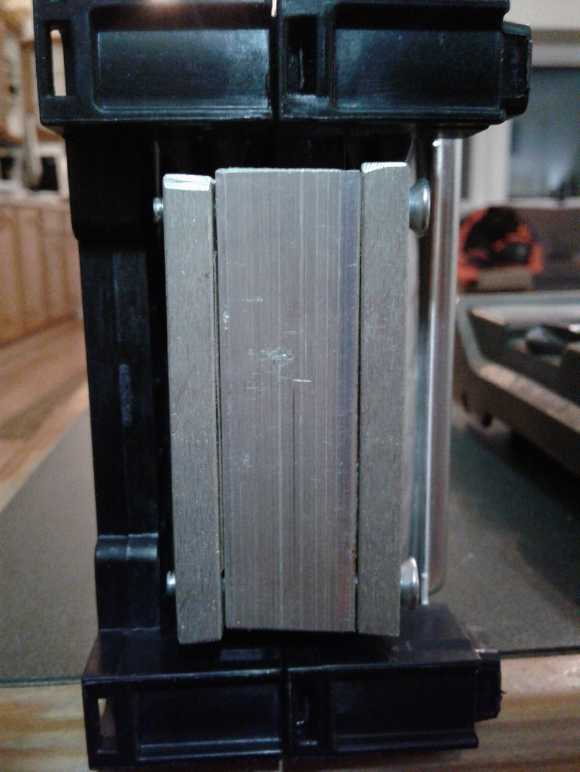 Here's
a description of the assembly I came up with to link the cells
together. One may find it easier just to refer to the photo. I
cut an inter-cell spacer according to my plan. It was 1/2" x
3/4" bar stock, by 65mm long with holes 55mm apart. That put the
holes for the bolts just outside of the cell connector tabs, one
on each side. 3/4" was the space to use between cells. (7/8"
might have been even better, but 3/4 was fine.)
Here's
a description of the assembly I came up with to link the cells
together. One may find it easier just to refer to the photo. I
cut an inter-cell spacer according to my plan. It was 1/2" x
3/4" bar stock, by 65mm long with holes 55mm apart. That put the
holes for the bolts just outside of the cell connector tabs, one
on each side. 3/4" was the space to use between cells. (7/8"
might have been even better, but 3/4 was fine.)
The end plates were 1/2" x 1/4", the same length
with the same holes. One of the pair had threaded holes for
bolts long enough to clamp the three pieces together. According
to the plan, the battery tabs would be sandwiched between the
pieces with the right spacing. Tightening the bolts would give
them a solid connection. Making holes with very little slack for
the bolts ensured that the clamp pieces couldn't "tilt" much and
the assembly would grip the four cell tabs securely.
There was more than enough width for the 11/64"
holes for #8-32 bolts, and I put them more toward one side than
the other as some of the tabs were quite short, and the closer
to the inside end they could be gripped, the better. (but making
sure no tabs were being tugged too taut as the bolts were
tightened). Having done it and looked, I think it would have
been better to use even thinner 3/8" x 3/4" bar, and 3/8" x 3/8"
for the ends. (a little thicker than 1/4" for better stiffness.)
Thus made a bit narrower, the clamps wouldn't have stuck out
past the plastic cell casing ends. Instead the connections stick
out about 1/8". But I have 24 feet of the 1/2 x 3/4 size and no
other, so I'm not changing it.
A cell weighed 1956g and the connection assembly
74g. 74/1956= 3.7% added weight. Very tolerable. 3/8" width
would be a bit less.
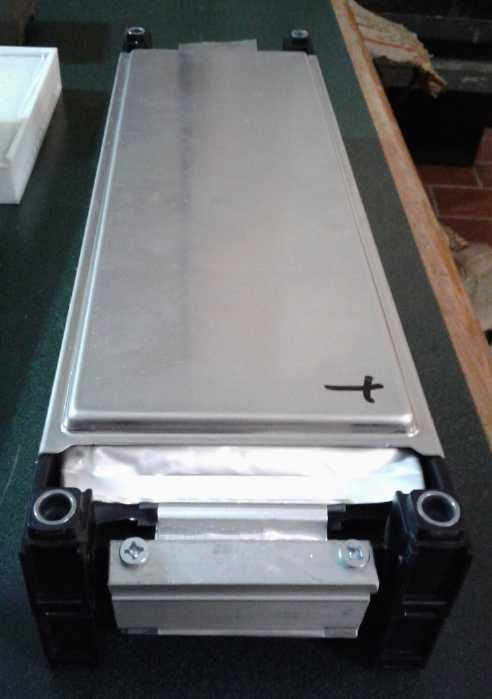
First two cell modules
stacked up and connected.
The corners 'click' together when stacked.
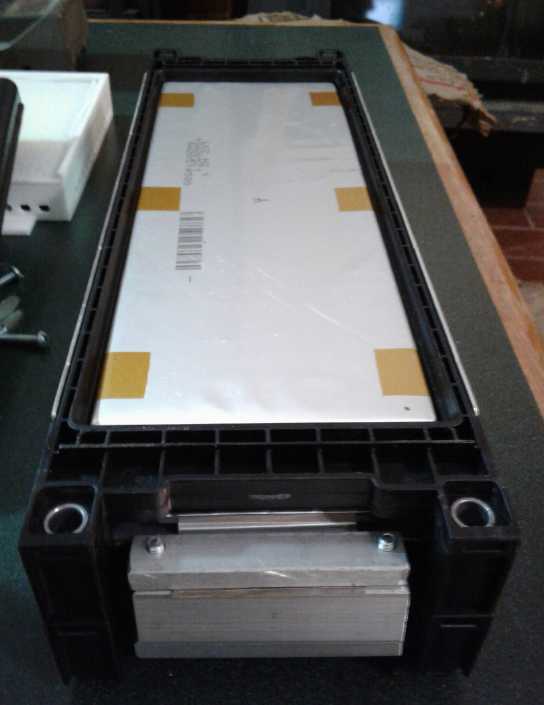
The underside.
The very bottom cell module in each stack will need a plate
fitted into
the recess to keep the bottom 2 cells from bulging down when
charged.
Well, that was one. 26 left to go to do all three
stacks of 10 cells. Then I can put the stacks in parallel for
360AH (13,320WH), connect the balance chargers, and wire them
into the Sprint which is also the house 36V emergency/'off grid'
supply.
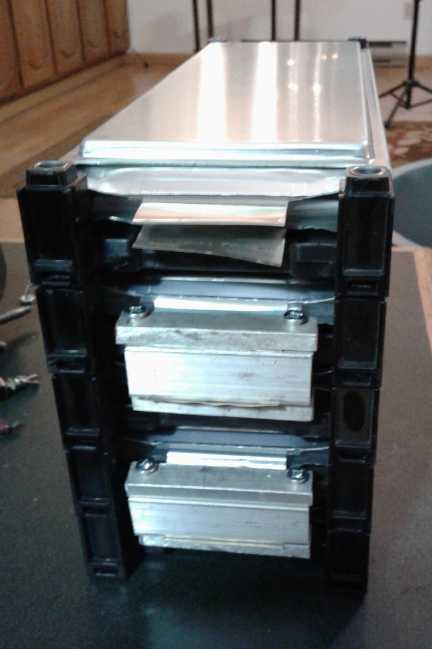 [24th]
I shortened the bar design to 60 mm with the holes 4mm from the
ends and made 3 more. Hmm... another work session and I'm all of
15% of the way there. But I'm almost 1/2 way to "Set A". And the
voltmeter shows higher voltage as more cells are connected in
series.
[24th]
I shortened the bar design to 60 mm with the holes 4mm from the
ends and made 3 more. Hmm... another work session and I'm all of
15% of the way there. But I'm almost 1/2 way to "Set A". And the
voltmeter shows higher voltage as more cells are connected in
series.
A new problem reared its head: I was out of #8-32 x
1.5" machine screws. In civilization I would just run out and
get a box of 100. I suppose I could get 7 blister packs of
eight... if they have that many.
 [27th]
I asked at lunch at the cafe in Port Clements and was told that
the Coop Home Centre in Masset had a good selection of nuts and
bolts. I had driven the Toyota Echo hoping another highway trip
would get it running better. (It didn't. Next: remove and
inspect spark plugs. Hmm... one spark plug recess full of
water!) That meant I actually could get to Masset (without the
Nissan Leaf to run out of charge on the way home). So (a
bit dubiously) I continued my drive north. Sure enough, they
just had 'spar packs' hanging on the wall. But I discovered
these packs were unusually generous with quantities - dozens
rather than a mere 4 or 8. One pack with the required machine
screws had 75 of them! Well, that was as good as bulk boxes
after all. Yay! (Ack - they were phillips instead of robertson!
Oh well...)
[27th]
I asked at lunch at the cafe in Port Clements and was told that
the Coop Home Centre in Masset had a good selection of nuts and
bolts. I had driven the Toyota Echo hoping another highway trip
would get it running better. (It didn't. Next: remove and
inspect spark plugs. Hmm... one spark plug recess full of
water!) That meant I actually could get to Masset (without the
Nissan Leaf to run out of charge on the way home). So (a
bit dubiously) I continued my drive north. Sure enough, they
just had 'spar packs' hanging on the wall. But I discovered
these packs were unusually generous with quantities - dozens
rather than a mere 4 or 8. One pack with the required machine
screws had 75 of them! Well, that was as good as bulk boxes
after all. Yay! (Ack - they were phillips instead of robertson!
Oh well...)
The daylight being gone by the time I finally got
home and fed the chickens, I spent time in the early evening
cutting 6 more sets of aluminum bars. Doing more at once surely
saved a lot of time - more work done between changing drill
bits, sawing, walking across the shop, et cetera. Then I
connected another five cells together. When I went to stack the
two sets of five, I found a flaw in my system: one can only
access the top clamp bar set with a screwdriver. If the
screwdriver were to touch a bar above the one being accessed,
there'd be a huge spark and some serious welding going on.
(Usually taking a big chunk out of the screwdriver or wrench in
my experience. So far I've had no worse results like batteries
exploding, but I'm not eager to press my luck.)
But I noticed that the clamp I had left over for
this last join had my original flat head screws. I tightened
them up with a small pair of pliers instead of a screwdriver.
Still that leaves a wire to each cell from the balance charger
to be connected. I may just drill and tap a hole through the
face of each clamp so a screw for that can be put in.
To finish (for now) I put two 1/4" threaded rods
through two of the four corner mounting holes to make sure the
stack didn't fall apart when lifted. I think it also needs some
plate pressing against the soft bottom of the bottom cell to
make sure it doesn't blow up like a balloon during charging -
like my tiny soft-shelled lithium-ion drone batteries have done.
It would seem the top of each one fits onto the bottom of the
one above, so only the bottom cell of each stack is a concern.
Next are the end clamps for the plus and minus
terminal connections.
Not having the balance charger set up yet, I
started charging each cell separately with a 10 amp lab power
supply. It is interesting to be pumping in 20 to 35 watts or so
and to see the voltage only rising maybe 10 millivolts in an
hour, and for them to take hours to go from 3.57 volts to 3.7.
Yep, they hold a lot of energy! I haven't even tried to fully
charge them. At 10 amps that could take 12 hours.
Stack of ten cells for 36
volts, "finished" - except for a bottom plate
and a housing for the whole thing - which will probably be one
housing for all three stacks. The red box is the Li-Ion
balance
charger. Every cell module plugs into it via the multi-pin
header strip.
 [28th] I made the end clamps and put big 1/2 inch
threaded holes in them for the heavy wires. Then, since each
clamp has to be done up in sequence as the cells are stacked up,
I took the whole stack apart again, drilled and tapped holes,
and added machine screws sticking out the face of each clamp as
terminal connections for the balance charger wires. Ugh!
[28th] I made the end clamps and put big 1/2 inch
threaded holes in them for the heavy wires. Then, since each
clamp has to be done up in sequence as the cells are stacked up,
I took the whole stack apart again, drilled and tapped holes,
and added machine screws sticking out the face of each clamp as
terminal connections for the balance charger wires. Ugh!
Ruminations About Potential
Results
When all three stacks are done, 4320*3 = ~13
kilowatt-hours is a good backup for the house - fridge, freezer,
well pump, lights - if ever it must run on solar power, or
enough for some good driving range if I ever actually get the
Chevy Sprint "ultra-efficient" EV conversion on the road.
Maximum continuous discharge current rating for
these cells is "3C", 180 amps per cell, draining the cell in
under 20 minutes. There are two parallel cells in each module,
so 360 amps for each stack, or 1080 amps continuous for three
stacks. (Seems ludicrous to me! I bet they'd get hot.) I trust
the car won't need half of that. Maybe even 1/3. I don't intend
it to be a "muscle car". Still if you want high power at a low
voltage, high currents are inevitable. Wires in a car are pretty
short, so fat wires aren't a lot of copper. 500A*36V =
18KW/24HP; 350A*36V = 12.6KW/16.8HP. (That's probably not a lot
of acceleration at higher speeds, but note that an electric
horsepower is worth a lot more than a gasoline horsepower
because of the way they're rated. (For a gasoline engine, the HP
rating is when it's "red lined" at full throttle. It would fail
if actually used that way for long. Electric motors are normally
rated for their continuous power without overheating and can
usually go substantially higher for short periods.)
I weighed the finished stack on my bathroom scale:
about 43-44 pounds. That's only about 130 pounds for all three
stacks. One doesn't need beefed-up springs in a car for that!
Distributing them with a couple at the back it's even less
concern. Plus, even adding the motor and torque converter to the
Chevy Sprint it's probably less weight than the original engine,
transmission, gasoline & tank, exhaust pipes and radiator,
keeping the originally 1710 (IIRC) pound car probably at or
under that weight.
One does wonder about efficiency, and about the
performance in general. The Sprint will be half the weight of
the Nissan Leaf. (and these batteries under 1/3 of those of the
Leaf.) The 12 inch wheels and thinner tires weigh 25 pounds -
probably less than half of a Leaf wheel and tire. I always
wonder about wheel rolling resistance. In watching a video I see
that thick sidewalls are better than the new thin styles. I had
thought the new ones must be better, but it's not so.
Furthermore, at high speeds big fat wheels have more wind
resistance than small thin ones. But what about wheel and tire
diameter? Does a tire 20 inches in diameter have more rolling
resistance, or less, than one that's 24 inches? And what about 4
inch tread width versus 7 inches? Perhaps one may assume smaller
wheels are better because the lightweight, 3-cylinder Sprint
with its small wheels was about the only production car in my
experience ever rated at 40 MPG (imperial gallons) for city
driving and over 50 on the highway. But I've never seen a real
rolling resistance comparison between wheel/tire sizes.
Anyway, with 55% of the battery energy storage,
does that mean the Sprint will go as far as the Leaf on a
charge? It probably does, or somewhere close. Obviously it would
have much greater range if given the same amount of battery
power, still at not much more than 1/2 the vehicle weight. And a
solar panel on the roof trickle charging would have more utility
than it would on the Leaf even if such charging was possible.
(Even if the panel was connected, the Leaf's computer won't
acknowledge any charge coming in from an unplanned source, or
while driving. The battery could be full but it'll still say
it's low and behave accordingly.)
A concern for highway driving is that the heavy
Leaf isn't easily blown around by sudden crosswinds. The Toyota
Echo can be a bit scary above 100 KmPH on a windy day, and the
Sprint is even lighter, although it probably has less wind
profile. (Oh well, highest speed limit on this island is 90.)
http://www.TurquoiseEnergy.com
Haida Gwaii, BC Canada




 I had purchased these new but 'surplus' cells in the summer - a
bargain but no small expense for so many. (30 + 2 spares) They
needed a custom means of clamping the floppy tab ends together and
to solid terminal blocks. I had arranged with someone who was
going to Prince Rupert to buy aluminum to pick me up a long piece
of 1/2"x3/4" that I could cut up to make these clamps. I finally
phoned to ask if perchance he had done it yet. He had, but he had
forgotten why he got that piece. Picking up the aluminum was the
pivot that got me putting the stack together. (Also I was a bit
concerned that they hadn't been charged in many months. The other
22 still haven't.)
I had purchased these new but 'surplus' cells in the summer - a
bargain but no small expense for so many. (30 + 2 spares) They
needed a custom means of clamping the floppy tab ends together and
to solid terminal blocks. I had arranged with someone who was
going to Prince Rupert to buy aluminum to pick me up a long piece
of 1/2"x3/4" that I could cut up to make these clamps. I finally
phoned to ask if perchance he had done it yet. He had, but he had
forgotten why he got that piece. Picking up the aluminum was the
pivot that got me putting the stack together. (Also I was a bit
concerned that they hadn't been charged in many months. The other
22 still haven't.)










 Why are this apple tree's leaves
turning yellow (25th)? They were green (12th) until half way
through the month. Where was that chart I put in an issue or two
back, showing what minerals might be lacking based on the patterns
and colors of the leaves?
Why are this apple tree's leaves
turning yellow (25th)? They were green (12th) until half way
through the month. Where was that chart I put in an issue or two
back, showing what minerals might be lacking based on the patterns
and colors of the leaves?
 [25th]
While I had started with some aluminum plate chunks to back LED
COB flat lights with, I had found that owing to having few and
short fins, the plates gradually got quite hot. So having gone so
far as to design a 3D printable case in OpenSCAD, I ordered some
finned heatsinks that were just the right size. When they arrived
I incorporated them into a new, slightly smaller LED COB panel
light. I printed a couple and liked the second one.
[25th]
While I had started with some aluminum plate chunks to back LED
COB flat lights with, I had found that owing to having few and
short fins, the plates gradually got quite hot. So having gone so
far as to design a 3D printable case in OpenSCAD, I ordered some
finned heatsinks that were just the right size. When they arrived
I incorporated them into a new, slightly smaller LED COB panel
light. I printed a couple and liked the second one.
 Notwithstanding that it was a very small project to assemble the
light, I did it in dribs and drabs over a couple of weeks,
finishing on the 25th.
Notwithstanding that it was a very small project to assemble the
light, I did it in dribs and drabs over a couple of weeks,
finishing on the 25th. It didn't
get as hot, even at 10 watts instead of 7. It's amazing how the
temperature just keeps creeping up from a few watts if the heat
isn't being effectively dissipated to the air. (Note: I could feel
some heat in front of the light as well as the warming heatsink.
Might heat yellow the diffuser?) Owing to the direction of the
cooling fins, if it's mounted on a wall the best orientation is
vertically. Putting it on "low" it was about 1.5 watts, and still
plenty bright, using a 10 ohm resistor. (1/4 watt resistor... I
wonder how warm that's getting? It must be almost 1/4 watt. I
don't have any 1/2 watt. Maybe I should try 15 ohms? 1 watt of
light is still a good night light.)
It didn't
get as hot, even at 10 watts instead of 7. It's amazing how the
temperature just keeps creeping up from a few watts if the heat
isn't being effectively dissipated to the air. (Note: I could feel
some heat in front of the light as well as the warming heatsink.
Might heat yellow the diffuser?) Owing to the direction of the
cooling fins, if it's mounted on a wall the best orientation is
vertically. Putting it on "low" it was about 1.5 watts, and still
plenty bright, using a 10 ohm resistor. (1/4 watt resistor... I
wonder how warm that's getting? It must be almost 1/4 watt. I
don't have any 1/2 watt. Maybe I should try 15 ohms? 1 watt of
light is still a good night light.)
 Here's
a description of the assembly I came up with to link the cells
together. One may find it easier just to refer to the photo. I
cut an inter-cell spacer according to my plan. It was 1/2" x
3/4" bar stock, by 65mm long with holes 55mm apart. That put the
holes for the bolts just outside of the cell connector tabs, one
on each side. 3/4" was the space to use between cells. (7/8"
might have been even better, but 3/4 was fine.)
Here's
a description of the assembly I came up with to link the cells
together. One may find it easier just to refer to the photo. I
cut an inter-cell spacer according to my plan. It was 1/2" x
3/4" bar stock, by 65mm long with holes 55mm apart. That put the
holes for the bolts just outside of the cell connector tabs, one
on each side. 3/4" was the space to use between cells. (7/8"
might have been even better, but 3/4 was fine.)

 [24th]
I shortened the bar design to 60 mm with the holes 4mm from the
ends and made 3 more. Hmm... another work session and I'm all of
15% of the way there. But I'm almost 1/2 way to "Set A". And the
voltmeter shows higher voltage as more cells are connected in
series.
[24th]
I shortened the bar design to 60 mm with the holes 4mm from the
ends and made 3 more. Hmm... another work session and I'm all of
15% of the way there. But I'm almost 1/2 way to "Set A". And the
voltmeter shows higher voltage as more cells are connected in
series. [27th]
I asked at lunch at the cafe in Port Clements and was told that
the Coop Home Centre in Masset had a good selection of nuts and
bolts. I had driven the Toyota Echo hoping another highway trip
would get it running better. (It didn't. Next: remove and
inspect spark plugs. Hmm... one spark plug recess full of
water!) That meant I actually could get to Masset (without the
Nissan Leaf to run out of charge on the way home). So (a
bit dubiously) I continued my drive north. Sure enough, they
just had 'spar packs' hanging on the wall. But I discovered
these packs were unusually generous with quantities - dozens
rather than a mere 4 or 8. One pack with the required machine
screws had 75 of them! Well, that was as good as bulk boxes
after all. Yay! (Ack - they were phillips instead of robertson!
Oh well...)
[27th]
I asked at lunch at the cafe in Port Clements and was told that
the Coop Home Centre in Masset had a good selection of nuts and
bolts. I had driven the Toyota Echo hoping another highway trip
would get it running better. (It didn't. Next: remove and
inspect spark plugs. Hmm... one spark plug recess full of
water!) That meant I actually could get to Masset (without the
Nissan Leaf to run out of charge on the way home). So (a
bit dubiously) I continued my drive north. Sure enough, they
just had 'spar packs' hanging on the wall. But I discovered
these packs were unusually generous with quantities - dozens
rather than a mere 4 or 8. One pack with the required machine
screws had 75 of them! Well, that was as good as bulk boxes
after all. Yay! (Ack - they were phillips instead of robertson!
Oh well...) [28th] I made the end clamps and put big 1/2 inch
threaded holes in them for the heavy wires. Then, since each
clamp has to be done up in sequence as the cells are stacked up,
I took the whole stack apart again, drilled and tapped holes,
and added machine screws sticking out the face of each clamp as
terminal connections for the balance charger wires. Ugh!
[28th] I made the end clamps and put big 1/2 inch
threaded holes in them for the heavy wires. Then, since each
clamp has to be done up in sequence as the cells are stacked up,
I took the whole stack apart again, drilled and tapped holes,
and added machine screws sticking out the face of each clamp as
terminal connections for the balance charger wires. Ugh!